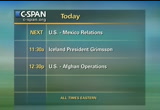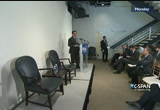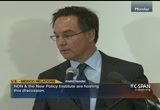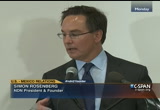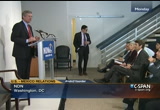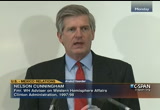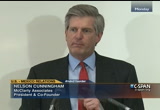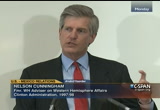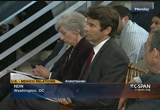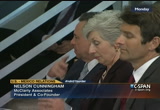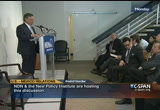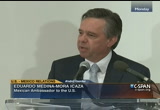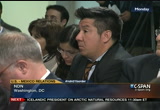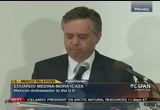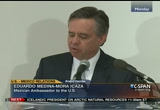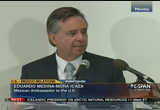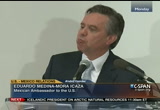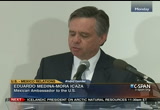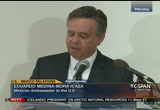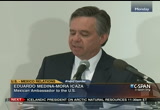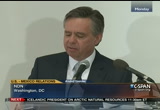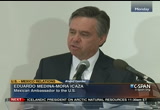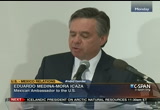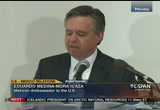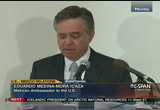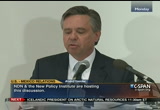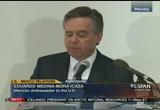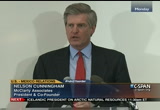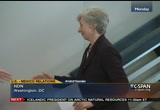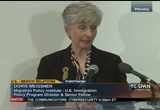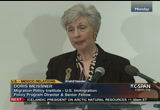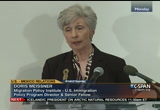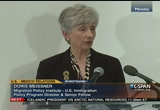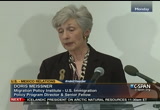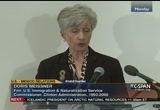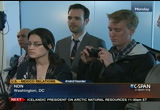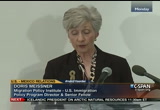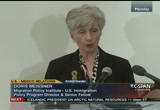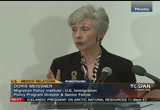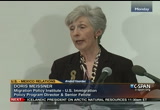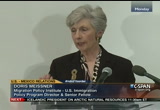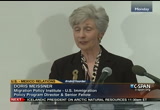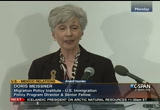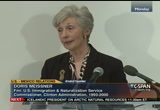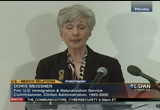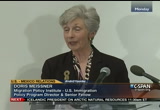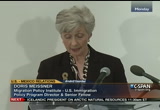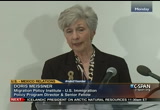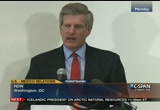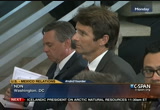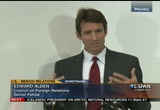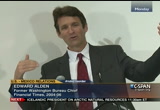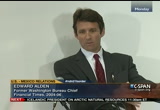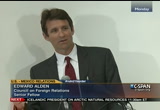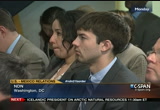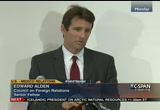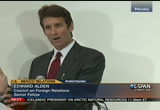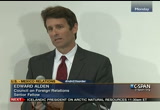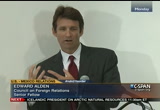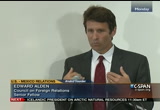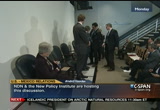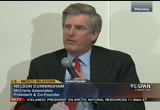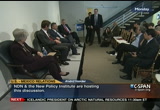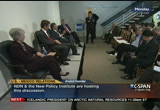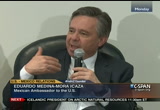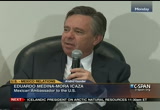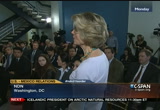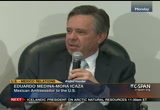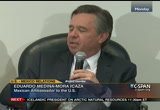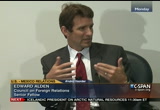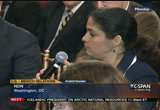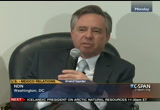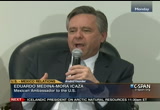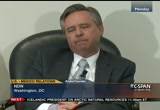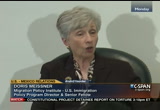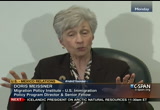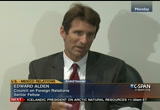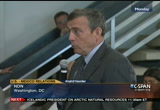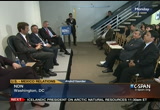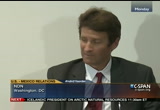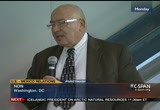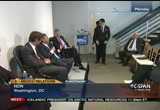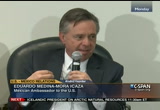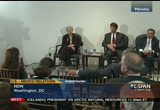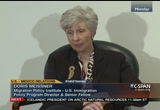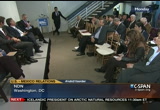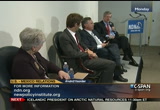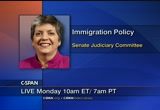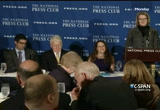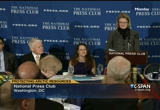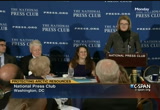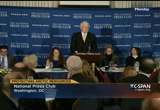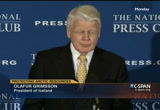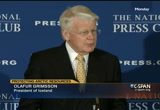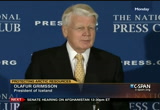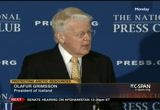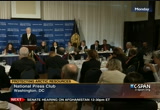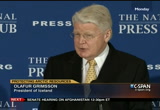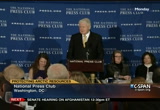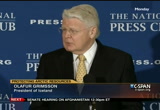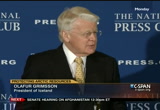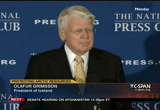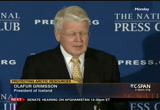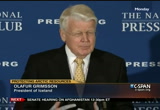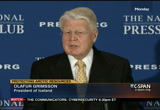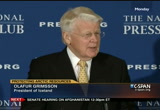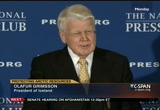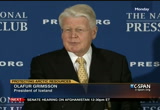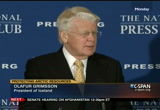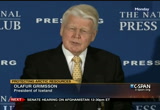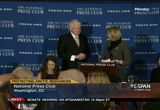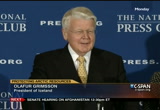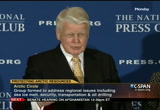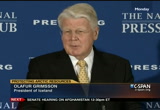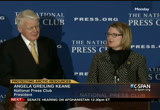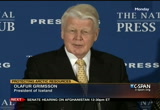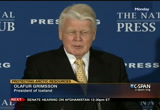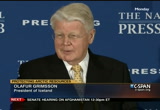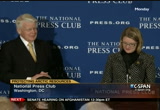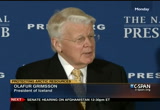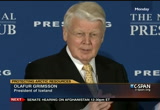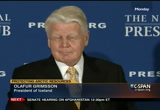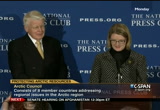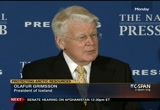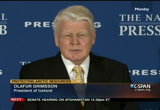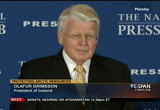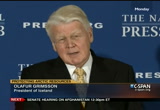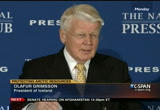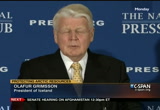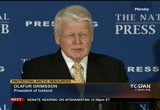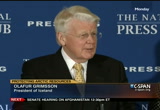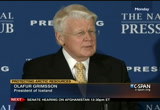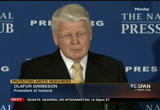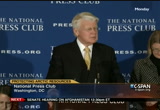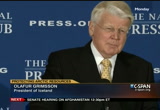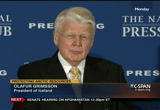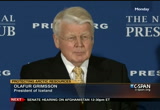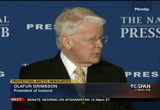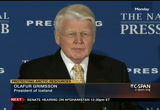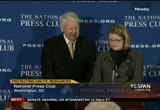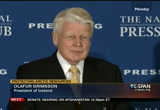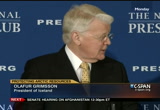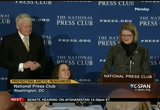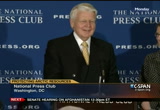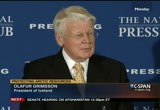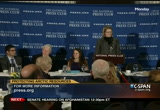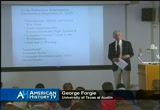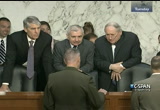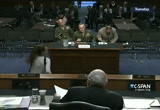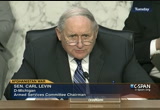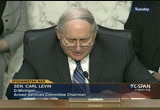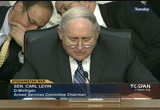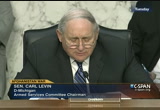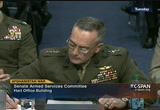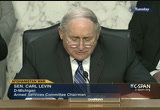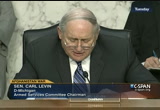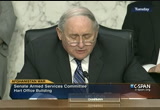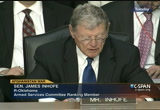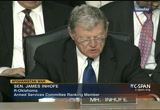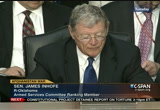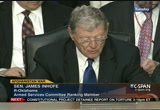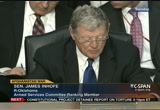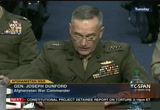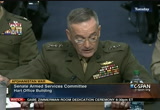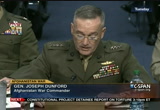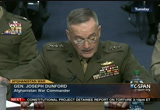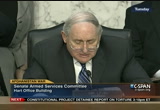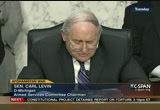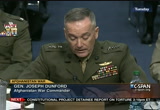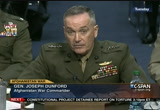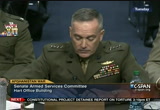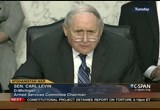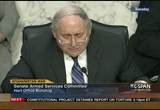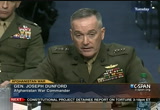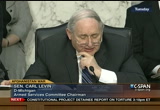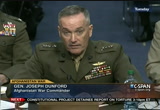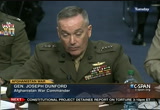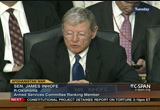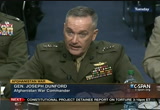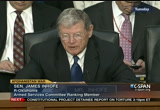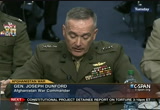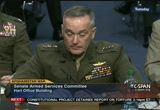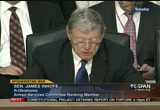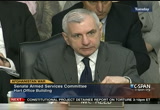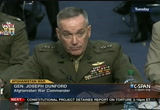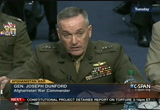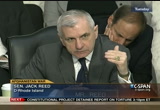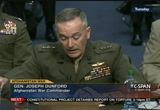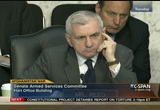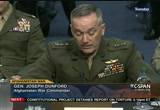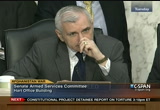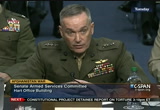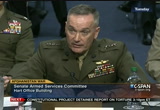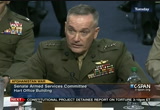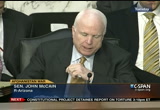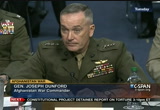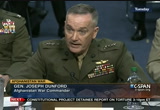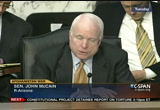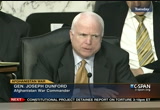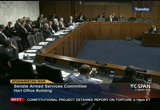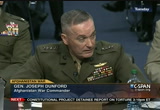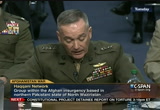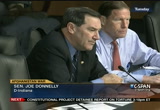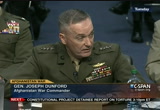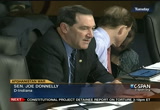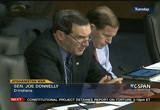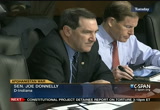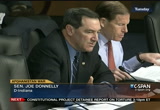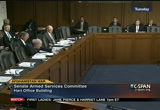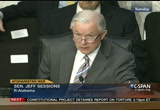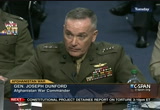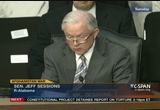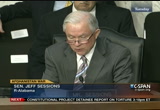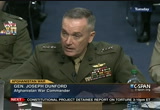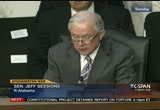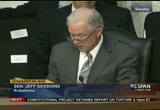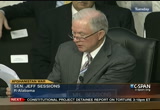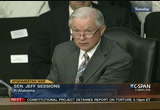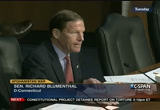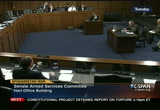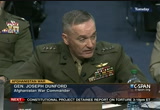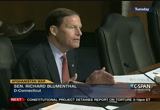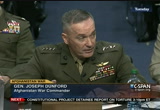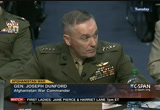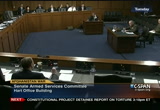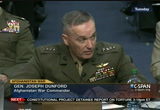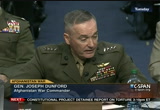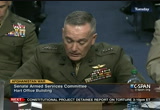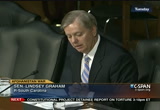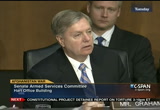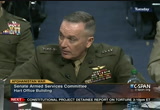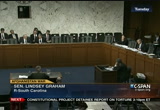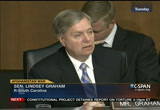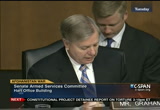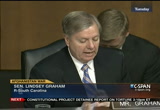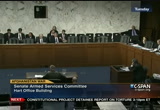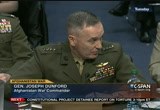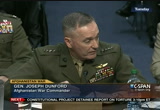tv Washington This Week CSPAN April 20, 2013 10:00am-2:01pm EDT
10:00 am
the relationship between mrs. lincoln and her husband abraham lincoln. watch this on monday, live at 9:00 p.m. eastern on c-span, c- span radio and www.c-span.or. coming up on tomorrow's edition of the "washington journal the senr potical editor. he will be here to look at political implications of thi week's events, including the bombings in boston and the background of the perpetrators and the debate on guns and immigration. we also will talk about terrorism and responses to terrorism. finally, on the program, we will a member of the constitution project. we will discuss a recent report the constitution
10:01 am
project's task force on detainee treatment act and the use of torture by the united states. it is indisputable that you can statesthe best be united engaged in the practice of torture. that is tomorrow's edition of "washington journal's we will see tomorrow morning at 7:00 a.m. eastern time. [captioning performed by national captioning institute] [captions copyright national cable satellite corp. 2013] >> the mexican ambassador to the united states talks about immigration. then a top of all -- the talk about that for resources.
10:02 am
and then the debate up on afghanistan. ambassador discussed immigration, trade, and the future of u.s.-mexican relations monday at an event hosted by the new policy institute. president obama is scheduled to visit mexico in may, where he will meet with the newly- elected mexican presidents. this is one hour, 25 minutes. >> welcome, everybody. we will begin. thank you for coming. if i can ask all of your potato chip bags be discreet in the way you eat them and the up with it -- obligatory notice of tournament -- turning off the ringers on your mobile phones, but encouraging u.s. the same time to plead as much as you want under the hashtag we are using today. i am the president of the policy institute. we have an extraordinary --
10:03 am
nel da i am hst twelcomehe new ambassador from mexico to the united states, who has already become a good friend to many here in washington. and just to introduce what we do here. we are a small, independent think-tank. hereve had a project called the 21st century border initiative for three years now. we have been trying to tell a simple story to policy-makers in washington, which is that, because of an increase investment, better strategy, and greater cooperation between the united states and mexico, perhaps unprecedented, that our border is safer on the u.s. side. is immigration system better. mexico itself is modernizing and growing to the point where mexico becomes the third largest trading partner, the second-largest in the world, and
10:04 am
we now export twice as much to mexico as we do to china. the reality of what has happened to demographically, economically, and politically over the last few years is not something we felt we erratically -- adequately understood. we worked hard to bring these new understandings to many. i am heartened as we began what will be a spirited debate about immigration, our border, our relations with mexico, and it is a pity the president's trip to mexico city in a few weeks, we see a great change in the understanding of these issues. not among all of the policy- makers debating this today, but there is really a growing awareness about how things are different than they used to be. we are having a wonderful event today.
10:05 am
i want to welcome and introduce our moderator today and our host, matthew cunningham, who is the chair of our policy initiative. yous well known to many of who have been working on issues of u.s.-latin american relations and the former clinton administration official, a super thoughtful ally of ours edo is prodding us to get ahead of the debate here in washington. he is a dear friend and he will be taking it from here. nelson, welcome. >> it brings the great pleasure to welcome you all here to one of the most timely sessions we have been fortunate enough to put on over the years. i have been attracted to ndn and have been closed for over a
10:06 am
decade. it is at the intersection of where politics and policy really makes the most sense. no where have they been more so than our dealings with latin america and particularly mexico. they are not just good policy but great politics. they have reached out to members at capitol hill on both sides, who are most thoughtful about the u.s. and mexico and our relations between the two this is one of the best programs has put on in a good, long time. it is because of the quality of the panel we have, but also because of the timeliness we have at the moment here not only do we have our president and the mexican president 2, a lot less he and hisweeks,
10:07 am
staff are busy planning that trip right now. the president will meet there for the second time. in thain when president elect came up here to washington to meet with president obama, shortly before his inaugural. it was a successful meeting. it is telling about the relationship between u.s. and mexico that the president is traveling to mexico in may to meet again with the president to discuss a broad range of issues. the second reason it is timely is because on the american side, we have not seen the policy environment the so conducive to dealing with the key issues between the u.s. and mexico.
10:08 am
the immigration bill is hot and heavy, front and center. marco rubio did ginsburg in espagnole. he had five sunday shows, to talk about immigration. the gang of eight is hard at work on that. guns, u.s.-mexico relations. outink the guns may come not quite as favorable to mexico's longstanding positions as the immigration debate might. i would take a 14 two. we will be in good shape. the third is trade. mexico, the united states, now japan, canada, are linked in the trans-pacific partnership talks. talks with many of our key trading allies across the pacific. many of us view it as a chance to help bring nafta into the
10:09 am
21st century. the three are very much on the u.s. agenda. it shows great forward progress. welcome all of you to what promises to be a truly fascinating session. be second reason this will terrific is because of our panelists. i will say little bit more about the ambassador of mexico. doris meissner, who i served with in the clinton administration. she is one of our great experts. also, ted. our series of speakers today, we will have first ambassador medina mora, then we will have a conversation including members of the audience. we have folks on the web able to send in questions, also. think hard and maybe someone in the room will ask the question. our first speaker is very excited.
10:10 am
he has just arrived in washington. he is immediately planning a presidential visit. that is fast work. he arrived here with a perfect background for dealing with u.s.-mexican relations. a longtime government servant on the mexico side, he participated in issues and spent 10 years in one of mexico's leading private-sector companies. since then, he has held a series of government jobs that really speak of experience. he served as secretary of public security.
10:11 am
most recently, he was mexico's ambassador to the united kingdom. theseortantly as all other backgrounds, he has critical posts under the president and was fast to please take on a new role here administration. he brings the full 362 u.s.- mexico relations. let me turn the podium over to ambassador medina mora. thank you. [applause] >> thank you very much, really, for having me this afternoon. i would like to think the
10:12 am
national demographic for inviting me to make this presentation and hosting this important and timely event. i especially think rosenberg, doris meissner, and edward alden. the face of change has been faer and more dramatic in the last 20 years. in that time span, we have witnessed exponential growth of mexicans in this country and a significant slowdown in 2010 according to the sector. in this presentation, i would like to share some thoughts about the recent affirmation of mexico, as its bilateral relationship with united states, i would place special emphasis.
10:13 am
first, structural change in our country. second, north america, our shared space, the region of opportunity. third, the mexico-u.s. border. prosperity and competitiveness. four, contribution of mexicans to this country. some regarded it as a unique window of opportunity conducted by fortunate coincidences. the united states and its people want this opportunity and that change has played a minor role. it might be the case the senate would see a bill this week. similarly, it is not serendipitous that mexico is not now doing much better. both economically and socially. we have made great strides in
10:14 am
order to reach this end we have worked closely with the u.s. toelieve now is the time cash in the hard work. today, mexico is once again removed. what happens to the faculties across the country is quite different from what some might assume. mexico is on a sustained path of progress. we are working together every day to overcome them. in the first 127 days, the main political parties signed a wide-ranging political agreement. congress passed already major risk structural of forms. it is not a coincidence the washington post and the new york times, among others, have
10:15 am
praised unless. we have not had a majority in congress since 1997. the mexican economy has expanded mexican have maintained growth since 2009. fromdp has increased $7,979 in 2009, to 2146 in 2011. in purchasing above 15,500. on gdp growth, almost four%, a higher rate, and is expected to grow 3.5% in the year. this is measured by j.p. morgan. mexico is also taking care of its people.
10:16 am
the brookings institution has highlighted that 60% of mexicans are middle class. by 2030, 80.5% of mexicans will be middle class. housing has increased more in the early 1's. all of these factors that have taken place review the immigration pressures of the past. academic think tanks estimate that net migration between mexico and the united states is
10:17 am
close to zero. a recent survey shows only 11% of mexicans say they would leave mexico if given the opportunity. a decline of about half from a 31% 2007. -- in 2007. over the last few years, our common border has increasingly become an area of prosperity. more more dynamic and secure than it has ever been. four in the united states and
10:18 am
six in mexico, have a population of 92 minute -- 90 million people. much remains to be done. our progress can be objectively measured. the corporation is stronger ever. for this new era of collaboration, i will share two examples with you. in may 2010, we signed a 21st century border declaration. for the welfare of the committees of both countries. the two governments works to get it -- worked together and meets regularly. it insures they say, specific
10:19 am
action facilitate the movement of people in a safe, efficient manner. this took place last week here in washington with important outcomes and agreements. the border between mexico and in a states is one of the busiest in the world, if not the busiest, with 43 points of and 32 international beaches. around $1.30 billion is traded every day and 300,000 across the state on a daily basis. however, no new bridges were built in more than a decade. we therefore open three new
10:20 am
borders in 2010. in the coming months, the first new railway crossing will start operations. the growth has just target and has begun operations. it is a huge set. we have succeeded in making them work. there are only two base specific actions among many. the nature of the border, and the goodwill of government on both levels, and on both sides of the border, creating interactions that keep us moving forward. north america is reaching critical mass and should remain
10:21 am
a region of opportunity. bilateral trade and investment within the region have grown exponentially. part of the expectations of some of us who were at the tables 20 years ago, in 2012 alone, mexico-u.s. trade reached $494 billion. more than $1.3 billion today. almost $1 million per minute. mexico is the third largest u.s. trading partner. we are a special partner. for one, the mexican market -- the u.s. economy in 2012. in mexico, $273 billion. this is more than the $210 billion of combined u.s. exports or of the country. excluding canada. this is more than u.s. exports to japan and china combined.
10:22 am
france,xports to germany, and the data kingdom, $175 billion. furthermore, mexico imports from the u.s. thetain and create jobs in economy. the u.s. economy says each of the additional billion exports more than six to 2 million jobs. $18 billion in [indiscernible] they helped create 107,000 new u.s. jobs. 6 million u.s. jobs relied on trade with mexico. the state's benefits from exports to mexico, mexico was
10:23 am
the main destination for exports come out soon -- arizona, and was the destination for exports fro30 states and was ranked. according to data compiled by the office of united states trade, services in mexico by u.s.-owned athletes were $34.40 billion. that was 2010. $4.80 billion in that same year. above all, mexico and the united states compete together in the economy. supplyroduction and chains in north america are deeply integrated. estimated at around 40%. as a reference, it is about 25% for canadian exports, a country
10:24 am
with which the u.s. is very much integrated. the u.s., four% for china. when an american consumer buys a product, 40% of the value comes from u.s. parts and components. this is unsurpassed by any other country. the quality is here to be underlined. finally, let me talk about the most important element of this equation. mexicans and the united states have always made great contributions to the economy and the communities they are leaving. is work ethic they display broadly recognized by the private sector. many are also entrepreneurs. they have continued to create jobs in the u.s.. mexins make
10:25 am
conts to the u.s. economy. first-generation mexicans contributed about 4.1% of the united states gdp in 2007. following the contribution of mexicans to gdp, up 3.8% in 2009. however, when mexicans are added, the contribution is closer -- the gdp is closer to 8%. mexicans also make local economies grow faster. most mexicans live in california, 37%. 4.3 million. in texas, 21%. 2.5 million. that is above the national average. according to the mexican
10:26 am
institute, the cities with more mexican immigrants are l.a., 50%. dallas, 5%. such a 10,000. the economy is in these cities grew faster than the national average. the government of mexico recognizes these. we continue to do so. mexicans remain -- their efforts to reach their efforts to achieve greatness. -- their efforts to achieve greatness. mexicans in the united states need to be on a positive dynamics now in place.
10:27 am
our partnership has proven to be a strong one, a positive one that impacts our society. a rare opportunity stands before us. if we seize them together, we will continue to thrive together. comprehensive immigration reform offers new possibilities. we have been closely and respectfully part of this debate. whenever crosspieces are to make sure to increase opportunities of our
10:28 am
national spirit on both sides of the border, regardless of the outcome of the process. president barack obama will visit our country. this is a fantastic opportunity to relaunch the relationship and will set the tone for the coming four years. it wilalso prove crucial to harness the deep energy of our partnership moving forward in the decades to come. i am confident the shared goodwill, commitment, and transition will lead us there. thank you very much. i look forward to our comments. thank you very much. [applause] >> thanks, ambassador. you set the table for a terrific discussion here this afternoon. coming out to get perspective from the u.s. side, particularly on immigration, is one of our great experts on immigration in this country.
10:29 am
this is someone who has been thinking about immigration issues since the carter and administration, who joined the clinton administration, served for seven years, as commissioner of the service. since then, she has been at the migration policy institute and has continued to lead the discussion in a progressive direction on immigration issues. it is fair to say, doris, in the time you have focused on this, it has been a roller coaster. we have had our down and up moments. this may be one of the better moments we can remember when it comes to a thoughtful rethinking of america's immigration policies, which is so key to our relationship with mexico. please join me in welcoming to the podium and fascinating speaker on immigration, doris meissner. [applause] >> thank you. good morning. this is an up moment in history.
10:30 am
will continue to be for the next weeks and months. i will talk from the u.s. perspective about an element of the big picture that the ambassador has painted. that is the u.s.-mexico border, and the relationship. very much from the standpoint of what is taking place today, a route that we have travelled over many years and why that is relevant to what is going on now. and will hopefully be going on legislatively in the coming weeks, as i said. the southwest border with mexico today that its origins in the early 1990's. those origins, about with the
10:31 am
issue of the southwest border and border enforcement having come to become a national issue, as compared to the local issue it had been for many years, decades, prior. it became a national issue because of a couple of things. largely was projected on to the national scene by the governor pete wilson running for reelection in california. and championing proposition 187. having passed, and that campaign for governor, having heavily on arguments that the borders are out of control. that assertion, and what the federal government was abdicating its responsibility, to deal with border enforcement and deal with that across the southwest border, became a
10:32 am
louder and louder call. it was accompanied by lawsuits in which the state of arizona and others sued the federal government for neglect. those were basically political assets. they did not have merit. they were dismissed by the court. there were very good examples of very strong political statements and feelings that were out there. the clinton the administration took them seriously. the clinton administration took up the issue of border enforcement as part of its broader anti-crime law enforcement. those efforts were part of that democratic thinking and action at the time. they took up the issue of border enforcement in a role that has become a tint to it -- a continuous stream since research. intoudgets that went
10:33 am
building the border and building the southwest border capability started in 1994. those budgets, i think when you look back at the record, the official start. taking border enforcement seriously. and putting a border effort into place that has become, since, a bipartisan support it issue. the question of putting them into the border has been a continuous stream since 1994. requests and appropriations,
10:34 am
when republicans and democrats led the white house and both republicans and democrats led either in the senate or house overall. this is an unbroken chain and continues to go. we see it in day to day. we will see when a bill is announced tomorrow or whenever, having continuing emphasis on border security and on spending on border security. with the initial budget, we worked on the border in ways that really try to put into place six basic principles for how it is a border enforcement ought to be done. there were changes from the way things had been done prior and what the thinking had been prior to that time. i will dwell a little bit on the ones that have to do with mexico because of what it is we
10:35 am
are talking about today. the first principle was, at that time, not practiced, deterrence prevention. the enforcement was the enforcement that prado -- provoked entry in the first place. it meant resources up as close to the border as possible, rather than waiting for people to answer -- enter and then chasing them around. close to the border prevention of entry. the second principle has to do with concentrating resources. rather than spring plan resources evenly, like in the past, the idea was to look at quarters and concentrate resources there in order to gain control in the areas that were the most heavily traveled. others were south of san die, the tucson corridor, then south texas. researcherse the went. that continues to be the areas that get the most research attention. there have been so many researchers since in these 20 years, that there is a tremendous investment of resources all across the border. the third had to do with the proper mix.
10:36 am
it was the proper mix of people, technology, and infrastructure changes. that also was a big change. all of the money had gone into border patrol in the past year the new effort was to try to get a much more effective combination of researchers spirit that continues today. i predict that when the new bill comes out, there will be all kinds of focus on drones and more modern technology, etc.. that combination has been a very important change, as well. tober three, they all have do with efforts made on the u.s. side, principles used that involved mexico in varying degrees. the fourth one of those
10:37 am
principles had to do with the engagement with stakeholders, in commuties as ll as the mexican government. and cooperation and increased cooperation coronation with mexico. that idea led to all kinds of community-based mechanisms, advisory committees, stakeholders with the border patrol. it also had to do with systematic operation, law enforcement agency to law enforcement agency, between the u.s. border patrol, as well as others on the ground, and mexico. there have been ups and downs
10:38 am
over the years. but those efforts at professional coronation, law enforcement agencies, perfectionism -- professionalism, and building trust and sharing information in order to solve problems on the ground as close to where they happened as possible, rather than having things best -- escalate and become national and diplomatic issues, was a major part of the border buildup effort. it was also a part of the border buildup effort to help mexico build its network in the united states so that mexico was in a much stronger position to provide protection and information and intermediaries in the country for mexican nationals who were in the country that has been a sustained effort that has also been very successful and was part of the overall border enforcement outlook that we brought to the problem. the fifth principle had to do with borders that work.
10:39 am
porter's that work were the idea that the borders were both to prevent illegal entry, but also to facilitate legal entry of people and goods. the borders were an important part of both countries prosperity and well-being and that we needed to let them be very more effective and more functional. we created the 20-minute rule. you cannot wait in line for more than 20 minutes to go through a port ofntry in a car. the first entry lanes, the fast traveler lanes, which involved structural changes on mexico's side of the border, which we had never been able to do with mexico prior to that. they were not willing to do those things. we created the kinds of relationships and efforts that allowed for borders that were -- work to serve the economy and our trade and interests. the final principle had to do with orders safety.
10:40 am
the more that the border buildup took place, the more resources that were put in, the more dangerous a place it had become. that danger has continued this phenomenon on the border. it has been a very serious negative aspect of what takes place with border enforcement. mexico did commit to work together on joint accountability for information for those tragedies, and we had never in the past traced back to the families were reconciled on our numbers on what it is that was going on on the border, all of that work became part of the relationship and on the u.s. side, a great deal more was done with emergency trading -- training, water availability, vehicles, and so on and so forth. when we look back from today,
10:41 am
there is now at least a 20-year history of efforts to work together with mexico on law enforcement issues. oft really had a lot successful by product. it had ups and downs. there were times where it was better and times where it has been less successful. it is the current key element in the relationship and a key element of a successful building relationships. of trust between the two countries. part of that was also possible because it happened against the bigger backdrop. it was enacted in 1993. what i have been talking about in 1994, and then there was the
10:42 am
big decision our two countries made that acknowledged that our futures were tied together. , that we needed to have a common future and it needed to be developed more affect -- effectively. for those of us working on issues on immigration on the borders, part of the arguments for nafta had to do with what implications it would have for innovation and change, changing the immigration relationship. i remember the various numbers in congress i was assigned where making a case for nafta. it was vercafully done. about assumptions changing birthrates, giving what we knew was going on at that point. we were able to predict that by
10:43 am
about 2014, there would be a structural change in mexico and that change was really the long term vision that nafta was moving toward because it would mean the drivers of innovation from mexico would begin to abate. onse things we were doing the border that had to do with immigration management, etc., also had the high level set of broader changes that would make it possible for our two nations. it is pretty fascinating now, 20 years later, to look back and see that those actually were pretty much on the mark and not only were they pretty much on the mark, but were ahead of schedule. what it is the ambassador has talked about this morning is really ahead of schedule now 2013, having begun to really
10:44 am
real as of 2010, 2011. its implications for immigration and illegal the twoion between countries were concerned. let me move forward with the ambassador has told is so important. it is so important because it is part of the convergence. the convergence of factors is about a set of critical changes that are very significant on the immigration debate. the first major factor is the u.s. recession and the aftermath of the recession. the dramatic drop-off of jobs and job availability in the united states that has been sustaining for illegal
10:45 am
immigration. the second factor, even if we go into a job recovery, most of the future will be the economy, not the kind of economy that generates the massive numbers of jobs we have seen during the past 30-40 years. as ambassador has talked about, the change is mexico that is real and lasting and are reducing the factors for illegal immigration. the third factor is the enforcement aspect i have tried to counsel. border enforcement could not have done the job alone, it has become potent. it is an important part.
10:46 am
these are changes that are here to stay because they are built into the budget and they are built into the post-9/11 capabilities that we have established as part of our overall national security. we have now a situation where there has been a historic shift. we and mexico have worked together on the border enforcement issues to the extent possible within what has been a broken immigration system. for the us-mexico relationship to mature rther, to go to the next level, this issue of the perversity of migration relationship that we are in is a big stone in the road that needs to be removed. we have got to get a much more rational system in place in order for mexico and the united states to co-exist and work together in ways that have incredible potential.
10:47 am
isis our responsibility, it not something that mexico can do, it is not proper for them to be in the domestic debate. at the same time, mexico's story, the story of mexico as has been told here, as we know it, as we come to understand is an incredible an important part of the dynamic. it is a story of how the assumption and the reality on the ground have changed. it should give us confidence, it should give the public confidence that immigration reform can safely take place. in other words, if it has a generous legalization measure it, counts on the enforcement in order to actually be viable is actually -- so it can take place. the basic underlying differences and changes that bring us to this new illegal
10:48 am
immigration from the united states, it is lasting structural changes. it is essential that there be a full understanding of the story as part of the immigration debate. it is also incredibly hopeful to be able to say that what is going on in mexico today creates a platform for a very future for all of us. we hope it is a platform and we see it as a platfohe t well-being of people in mexico, canada, and the united states is more similar than different. where we have a feature of borders that are managed both to protect our nations, but also
10:49 am
facilitate between trade and travel. migrationure for among our nations is a choice, not a necessity. thank you. [applause] >> thank you so much, doors. -- doris. a very exciting week for you as we see what the gang of eight will come up with. we have heard from two direct participants, the ambassador and doris messner. one of our most thoughtful analysts.
10:50 am
ted alden is on the council of foreign relations. he has written a book on u.s. border security called "the closing of the american border: terrorism, immigration, and security since 9/11." he was the director of the council on foreign relations task force study on immigration reform cohead by jed bush and my partner, matt mcclarty breaking both perspectives. -- breaking both perspectives. he also had andy card and tom daschle on u.s. trade and investment policy abroad. -- only that, he has spent he was an active journalist both here and in canada. it turns out that he spent much of his childhood and his education in canada.
10:51 am
--will ring a perspective bring a perspective to this debate. thank you very much, ted. >> thank you , nelson. it is great to be here. before we have a chance to go to the questions, we have been involved in this for so long. decadetaken more than a to forget how consequential this bill could be. in 1965, the u.s. created the architecture of the moderate legalization system. in 1986, the congress tried to solve the problem of illegal immigration. this bill is an effort to do both, to rewrite our system for the future and to establish an ongoing basis illegal
10:52 am
immigration. it is a monumental undertaking. it is important not to lose sight. one of the comments that focused on security, the u.s. economy, and flexibility in the future. one of these things that doris went through in detail, what has made this moment possible is a transformation of the situation along the u.s.-mexico border. when i was a journalist, i was working for "financial times" and i interviewed a key member of the gang of eight. i went to see him in a place called snowflake, arizona where he grew up. it was established by mormons. in the 1970s, 1980s, his family ownen a huge herd of cattle. they would bring them down in the winter and need them -- feed them. most of them on the farm came from mexico.
10:53 am
jeff was candid that they would hire whoever came to work. that would work for 5, 6, 7 months and make good money. it was a system that worked well for those individuals. worked well for the farm. there was a happy coincidence of interest. for a variety of reasons, the numbers of people coming into the u.s. illegally began to spike. the u.s. began the big border buildup. comes hard for people to back and forth. i cannot easily, and go back home. -- they could not come easily and go back home.
10:54 am
it became a large step population of illegal immigrants. the challenge as i see it is really to re-create through formal means that kind of natural economically driven circular migration that has existed for decades. we are going to make this happen, there are three things. i see them developing and this bill. one is about what is going on at the border. we need to know how many people are getting and successfully, how many are we missing? how
10:55 am
secure is the border and making it difficult for people to come to you and says to do that. that is going to be necessary to sustain some kind of faith and integrity in the system which did not exist, has not existed for many years. secondly, we are going to need more legal means for people to come. there has been encouraging process on a new program for low skilled workers on a new program for agricultural workers. we want to create a system where the penalties for coming illegally are high. there are real options for people to come to the united states. thirdly, we are going to need cooperation with our neighbors. particularly mexico, some of this isn't being pioneered between the united states and canada.
10:56 am
some people come legally, but they stay up past their visa. how do we know if they have gone home? the canadians are going to share all of their information with the united states, when people come and go back to canada, we will know that. quite possible to do the same with mexico, again to ensure integrity of the system going forward. second issue of economy. one of the things i have rarely seen change over the last decade that i've been paying close attention is the recognition of how important immigration is to the u.s. economy. e have looked at immigration as a favor we do for other countries. everybody wants to come to united states, sobel was set at -- we will set a certain number of.
10:57 am
it is a real recognition it is a competition for talent. immigrants are extremely valuable for our economy. statistics on foreign students in science and engineering programs were two thirds of university students that come from abroad. starting up companies, all of the things they do out of proportion to their numbers. we publish a report last year on mexican entrepreneurs. we have seen a move in the debate. if you have a debate on immigration, we saw that even in the last congress when nothing got done -- big votes and the house. we have also seen the second front on the legal side, some real progress in facilitating legal entry. if you look at the visas, for instance, before 9/11, it was far too easy to get a visa and the united states. we do not scrutinize very carefully. after 9/11, it became too difficult. many people got discouraged. we are starting to get to an equilibrium. will set up a system that works and a reasonably prompt fashion for the people who want to come from those we do not want. part of the second term of the
10:58 am
bush administration, we mentioned the land border ports of entry. there was a new study last week that a friend of mine worked on that he just released. forl be turned around public release. it showed the value that the union -- u.s. current economy. finally, i want to briefly talk about flexibility. the unfortunate things about the system is we have this incredible rigid system. congress sets the quotas, the quotas are fixed. there are some categories that are hard to legislate. they change it once every 20 years. countries like canada or australia or some of the european countries, the systems are more flexible and adaptable to the needs of the economy. gordon hanson out of california did a paper for us where he noted that the only flexible part of the u.s. system is the
10:59 am
legal part. it is the only part that rises and falls depending on the economy. we need to crave that kind of flexibility in the legal system. doris is a new leader on this at the wilson center. they recommended a standing commission on labor markets. to create a real research capacity in the u.s. government to look at the needs of our economy for immigrants. it is shocking how little that has done and the u.s. government. we have something called the international trade commission which employs about 200 economists that can answer the same questions. what will the impact on the economy be? you can answer these kinds of questions. no similar on the immigration side. i am very encouraged by that. what we need to create, what i hope this bill will be a big first up is an ongoing challenge in creating a system that allows the united states to manage immigration for the economic and social benefits of
11:00 am
americans. to see this as a critical part of our economic future and one that actually works that has integrity. if we do that, we not only help ourselves, will help what we need to create, what i hope this bill will be a big first up is an ongoing challenge in creating a system that allows the united states to manage immigration for the economic and social benefits of americans. to see this as a critical part of our economic future and one that actually works th has integrity. if we do that, we not only help ourselves, will help our neighbors to the south was paid a very bigp rice for our mismanagement of our system. -- big price for our mismanagement of our system.
11:01 am
11:02 am
>> let's move to the discussion part of our discussion. let me reiterate something we touched on earlier which is to thank simon rosenberg for putting this together. it is another hallmark and the continuing work on these issues. i know a lot of it comes from your own brain and energy. and a very capable staff that you have. thank you for doing this. we have just under 30 minutes to have a conversation to engage the members of the audience. let me start with the question and we would turn to the audience's question. -- and then
11:03 am
ewe will turn to the audience's questions. we do have the two presidents meeting in less than two weeks, by that point immigration legislation would have been tabled, but not discussed. it will be toward the tail end of what is going to be a vibrant discussion in the senate on gun legislation which will begin this week. all of those things will be in trained, what do we expect the president to do in three weeks? -- weeks to advance any o fthefe critical issues between the countries? i will start with the ambassador. >> the focus is going to be to enhance the opportunities in our economic states. to create competitiveness --to reduce transaction cost. [inaudible] >> is it working now?
11:04 am
the most important focus, it is going to be advancing the competitiveness of our shared states. actually, improving -- [inaudible] it will be improving our shared economic state which of course includes a comprehensive approach to immigration, trade, job creation, innovation, education, technology which have actually, the focus is to reduce transaction cost. actually, our shared competitive states in order to create an opportunity for mexicans and
11:05 am
americans. that is exactly what we have done in the last 20 years. when you see the numbers and some of the numbers that i just provided, the importance of mexico for u.s. exports is much more important than citizens on both sides of lots of jobs ink. the u.s. and mexico depend on how effectively integrated ouwe are. it depends on how effective our economies are. how integrated we are. as i said, if an american consumer buys a car or a house or appliances, that was manufactured in mexico, 40% of
11:06 am
the value of that product is american. if youo buy produc w manufactured in china, it is only four percent. it is because we are combining the best advantages of both sides of the border. integration approach, which is precisely the point. we will be seeing how the immigration debate works. in which we have a strong interest, because we have a strong responsibility to our mexican nationals here for opportunities and the opportunity to contribute to america. as america is one of the greatest countries in the world, precisely because it has
11:07 am
embraced immigration. >> thank you, ambassador. do you have anything to add on the president's visit, if not we can turn to the audience? >> the ambassador said it really well. competitiveness is a key issue, and there are a lot of gains to be realized which we have just began to explore. i would second that. >> let's turn to our audience. a lot of our members know a great deal about mexico. i want to start in the front row. i will ask you to speak up with your questions so we can be heard and we will try to repeat it for those on stream. i understand that close collaboration is coordination between u.s. and mexico.
11:08 am
can you give us -- [inaudible] >> the question for those of you who could not hear on the web relates to the transpacific partnership discussions which includes the u.s. and canada. whether or not it is starting with the european, the transatlantic discussions and which mexico and canada are not participating could benefit from that participation. >> we have stated that as our economies are so much integrated, it would make a lot of sense to address the transatlantic partnership together.
11:09 am
it is actually, it is very difficult to identify a product that is only mexican, only canadian, only american. it is very difficult on how these negotiations will work and the frame will be set. we will insist with our american counterparts that we believe that we need to be in these conversations. it is been going on for 11 years now. canada is about to finish their own, so it would make sense to effort.s. -- have thise f otherwise, we might find ourselves without results. not adding value to the shared manufacturing and
11:10 am
and competitiveness, but to put some additional burdens into this. the name of the game in competitiveness is reducing transacion cost. to do that, we have to do this together. >> that would be quite a three- dimensional game of chess if we got both oceans that included the canadians and the mexicans. >> the u.s. has been a little lackluster on the trade front. the u.s. is in a position of looking to canada and mexico for guidance on how to negotiate with europe. for a long time, the u.s. was the leader in pursuing free- trade opportunities around the world. not unlike immigration, the rest of the world is linked. we were a leader on trade and immigration. other countries begin to recognize the value that comes from being big players in those areas. in trade we find ourselves in the positions of looking at a canadian agreement, a mexican agreement with the eu for how we
11:11 am
start and how we can build on those. it is definitely room for cooperation. >> other questions? on the second row. right there, you. >> thank you for taking my question. it will be primarily for the ambassador. the immigration bill will be presented tomorrow and there is a strong border enforcement opponent. can you tell us what mexico's role would be an increasing their border enforcement? mexico already cracking down on the southern border side of stopping central americans. the u.s. has always demanded that it do more on the northern side. are there any legal barriers, any constitutional barriers that would not allow you to stem the flow of illegal immigration to the u.s.? i know there is the freedom of ovement within mexico, right?
11:12 am
the laws deal with that. i was wondering what you see your country's role in enforcing security with this new bill. thank you. >> the border is of course a natural, shared responsibility. we have to see what doris was saying. the forecast that was made 20 years ago is here now. in 1960, the fertility rate in mexico for women was 7.2 kids per women. today it is 2.2%. in cities like mexico city, it is 1.8%. actually, the supply of mexicans entering the labor force and willing or able to migrate has dramically shrink.
11:13 am
i remember when i was part of the border safety agreement in 2002, it was -- back then we were using an old reference. around 7,000 head count. last year, it was 22,000 headcount. this is not only because the border patrol became much more effective in doing their job, they did. also, the supply from mexico to cross the border to migrate into the united states is not there anymore. this is essentially a zero net migration into the u.s.
11:14 am
we have commitment and responsibility to cooperate with the united states, both ways. it goes back and forth, of course. trafficking and illegal -- actually handling of -- it is behavior with a working together for many, many years. in that sense, it has been very much on the bilateral agenda the last few years and in the in re. -- and will remain the future. >> other questions? international business advisors, llc. the question is, why would labor unions and the congressional
11:15 am
black caucus want to vote for legislation that would increase substantially the labor pool in the united states? [inaudible]the issue here is regulated flows. as compared to a laissez-faire marketing system to what we have been running for the past 40 years. it is in our interest to be weperating in a system where are actually managing migration, hopefully flexibly that has a relationship to what the market 20ds that can change, not in
11:16 am
or 30 years when the pressure that youts so tight have to have years and years of trying to get through legislation. , so wemore organic basis are supplying the labor force with jobs and work. were talking about high school, medium scale. we are dealing with demographic changes in the united states. it is the first time in history as a country that we have had that experience. innovation needs to be part of our future.
11:17 am
labor unions have an interest in that, as do employers. >> i think you have to start from the current system, which is where so much of the labor demand is made up of an unauthorized workforce. congressional black caucus has come to recognize this. the issue is about numbers. in a weak economy with higher unemployment we want less migration. in a stronger economy, we want more immigration. i don't think this bill is going to be as flexible as i would ideally like. look at the agreement on low skilled immigration, they are looking at lower, downwards of 20,000. 200,000 is a real number. that makes sense . >> the gentleman here in the
11:18 am
front row. .> independent consultant trade there was a 90% attention rate -- apprehension rate. if you take a look at the present statistics, 5% of northbound cocaine is seized, a fraction of 1% of money laundering being seized, and who knows what percentage of people coming across the board illegally are apprehended -- border illegally are apprehended. with the german border, the east germans were successful in apprehending 95% of people attempting to escape.
11:19 am
it seems like 90% is going to be an unattainable bar. if that is unattainable, is that going to impact potential reform measures? >> i could give you a long answer to that. there will be a forthcoming long , you'rerugs right. the percentage of drugs being apprehended is tiny. i'm hoping the language that comes out will not inflate -- their different problems. targets.n favor of 90% is an interesting number. you use the statistics ,athered by the border patrol looking at who they see and ,pprehend, in the tucson sector
11:20 am
87% of the people who try to get into arizona are apprehended by border patrol, 64%, or are turned back. they come in, take a look around, they go back to mexico. border patrol thinks it can reach a 90% number if you put those two together. refers to number that, we are close to hitting that target and a lot of high- traffic regions. -- in a lot of high-traffic regions. it depends a lot on the numbers. it is a pure apprehension rate number, i agree with you. that apprehension plus people who get discouraged and turned back, we are not that far from it. ris?oors >> no. >> steve landy, manchester trade.
11:21 am
i want to admit to something. go to miami and way to get your passport stamped and you say, used to work with doris, we get a smile. [laughter] >> thank you. >> let me say one thing for the record. the original language of a new partnership was used by president obama talking about africa. when people talk about the transatlantic partnership, people think it is u.s.-africa. my serious question has to do with mexico's new role. mexico probably has the best record to tell in terms of growing into an open economy.
11:22 am
my suggestion, very quickly put -- when you're meeting with president obama, why don't you mention the need to develop countries like ghana, mexico, andter rica -- costa rica so on. i think the world needs a new model. mexico should be part of that model in relationship to wto. .hink you so much >> it is easy to identify like- minded countries. ,he pacific alliance, chile colombia, peru, and mexico are moving forward quite quickly.
11:23 am
we want to enter new trade agreements because we understand what free-trade does for economic advancement. .ffectiveness, competitiveness we are competitive in manufacturing because we share the best of our abilities with the u.s., and then we can compete together in manufacturing in the world. if you actually envision the right set of policies -- not only about market access. it was actually about transforming the approach of public policy. ,t has been tremendous success
11:24 am
because mexico is a much better country in every single sense that it was 20 years ago. policy that came out of more sophisticated trade agreements is a good idea to have. >> in the front row. >> thank you. after the cooperation on border , do you think it is appropriate to have $3 billion [indiscernible]and seder security -- in borfeder
11:25 am
curity? >> it does depend very much on what that is supposed to be for. if a great deal of that is directed towards ports of entry, makinginfrastructure, it possible to have a modern border that really brings the elements of trade and travel on par with what has been done in the investments with border patrol, those would be worthwhile investments. that is not a modern border. there's not enough room to use the technology. .e will have to see you could invest very effectively substantial amounts of money in improving the
11:26 am
border. the question is what they are asking for. i will reserve judgment until we actually see that. >> we would like to see is , useced trade facilitation technology and infrastructure. andould have a 21st trade economic relationship with a 20th century narrative on a 19th century infrastructure. [laughter] we need much more investment into that. hopefully the money goes to trade facilitation, reducing the transaction cost of moving goods and people locally throughout the border. >> i'm afraid we've run out of time for the rest of the session. i would like to and with this, before i ask you to thank our guests. we do a great deal of work with u.s. companies working south of the border. we work with mexican companies
11:27 am
going elsewhere. , it three, four years ago was very difficult to have a discussion about u.s.-mexico on anything other than one topic, and that was border security in the sense of citizen insecurity, kidnappings, murders, killings, dramatic rubbles occurring just south of the border. troubles occurring just south of the border. insteadeat to have is focusing on the big issues in u.s.-mexico relations. that is a testament to the work done.he three have thank you all. please join me in thanking them as well. [applause]
11:28 am
[captioning performed by the national captioning institute] [captions copyright national cable satellite corp. 2013] >> on "newsmakers," representative luis gutierrez talks about efforts to develop an immigration bill in the house. sunday at 10:00 a.m. and 6:00 ..m. eastern on c-span next week hear more about the immigration debate proposed legislation from the gang of eight. a bill was unveiled this week with the support of the white house and other organizations. the senate judiciary committee will hold its second hearing on the proposal live monday at 10:00 a.m. eastern here on c- span. >> today, the president of iceland talks about the race for natural resources in the arctic
11:29 am
trad. later, a report on the treatment of suspected terrorists. >> on monday, iceland's president announced the creation partnership among the arctic and international partners. the group called arctic circle aims to address regional issues and challenges, including sea ice melt, managing fisheries and the ecosystem, shipping, and the development of natural resources. this is an hour. >> our guest today, icelandic president says we live in an ice dependent world. perhaps it comes as no surprise that president grimson would like the world to take notice of the clay sears and cic that dominate his arctic neighborhood -- glaciers and sea ice that dominate his arctic
11:30 am
neighborhood. the british educated political scientist, elected july 30 to a record fifth term as iceland's president, has a global worry that the north kohl's shrinking ice caps is wreaking havoc on the weorld. the disappearance of the arctic sea ice is threatening life as we know it, he told french students and scientists at a paris university lecture. iceland is a member of the arctic council, which is 80 nations that include the u.s., canada, norway, finland, and sweden. the council has reached environmental treaties, but deep concerns remain. as interest in the polar , other nations
11:31 am
have asked for a stake in the arctic, including france, singapore, china. chinese scientists traveled to research whether polar melting had caused extreme weather in china. today iceland became the first european country to sign a free trade agreement with china. says the timesson has come to settle the resource claims in the arctic to take steps to address the environmental degradation of the polar ice cap. polarizing.re but president grimsson has not shied away from controversy and tough policies. president grimsson, iceland's first ever professor of political scientist, was elected to the legislature in 1978. innovative radio and television programs from 1966 to 1971.
11:32 am
he has edited newspapers and served as iceland's finance minister. in 2008, he presided over iceland's near economic collapse. the country's unique response, which included social and political reform and allowing the country's banks to fail, pulled iceland back from the brink without the austerity measures demanded by other european leaders. all,ps most challenging of he has raised 20. please help me give a national press club welcome back to president grimsson. [applause] thank you very much for these words of welcome, and hosting us here today for a very special occasion where i have the privilege later on in my introduction to announce the
11:33 am
andblishment of a new venue at enhancing the dialogue of the corporation -- cooperation on arctic issues. sometimes here in washington, the arctic looks as if it is far away. ,erhaps in the minds of many the hidden part of the world as it was in the beginning of the 20th century. our knowledge of that neighborhood was still very limited. until the first decades of the 20th century. brought this territory into the military nato, butof not only dat every country in the arctic was
11:34 am
. at the end of the cold war, we saw an enormous transformation in the arctic. it suddenly turned from being a highly militarized, confrontational part of the globe into a very successful demonstration of positive and constructive cooperation. during the clinton-gore administration, the eight arctic countries decided to make it our arctic. a global territory where the eight countries with geographical position came together in the arctic council, which in the beginning had a limited mandate but has in inent years started to agree further steps in corporation. in the second decade of the 21st century, we have seen that what we thought was our arctic
11:35 am
becoming the global arctic, with countries in faraway places wanting to have a seat at the arctic table. to indicate this interest, in every meeting i had with leaders of asia, whether it was the prime minister of china, south korea, singapore, and now last week also with the foreign minister of india -- and every one of these meetings, the item they wanted to discuss was not if, but when they would acquire a seat on the arctic council. that should serve as a wake-up call for us.
11:36 am
we might ask ourselves, why is it that countries in asia, global players in the 21st century economy, have suddenly acquired this enormous interest in what we thought 10 or 15 years ago was exclusively our arctic? there are many reasons. one is that with the melting of the arctic sea ice, we will see in the near future opening up of new shipping routes, linking asia to america and europe in the same way as the suez canal in its time. one reason why the leadership of china has such a strong interest in the arctic is that they are already planning for a world where china will be the preeminent trading country in the world. if they send their cargo ships
11:37 am
through the northern routes to europe and asia, the distance will be shortened by more than 40%. china is already building ships for this purpose. they're already formulating plans indicating the number of that will sail through this route. singapore has already got an arctic ambassador, with the primary mission of finding a location for a big singapore hub somewhere in the arctic region. indicateduez canal, trading transformation of the century, the opening up of the northern sea routes will indicate a fundamental transformation of the global trading system in the 21st century. the second reason is the melting of the arctic sea ice and its
11:38 am
impact on the global weather systems. one of the reasons why the chinese polar institute sent the icebreaker from shanghai to iceland, the first time in history a chinese vessel goes from shanghai to our arctic country through the mouth or -- northern route, was they discovered that the melting of the arctic sea ice had tremendous implications for the extreme weather events that occurred in china the following winter. another result of the expedition last summer, the a-- chines horities spirits in many regions destruction of the infrastructure -- experience in many regions destruction of the infrastructure perhaps greater
11:39 am
than storm sandy caused in the united states a few months before. storm sandy also partly caused by the melting of the arctic sea ice. if you remember the symbolic picture of governor christie and president obama embracing a few days before the presidential election, a political event thought impossible by almost every commentator in the u.s. clinical system -- it was the melting of the arctic sea ice that brought them together. forcating the implication the american political system. the third reason is the enormous resources in the arctic. it has been estimated that about a quarter of the untapped energy resources can be found within the arctic.
11:40 am
in addition to various minerals and other important items. one of the reason why the president of south korea visited greenland last year, and why you have a long list of global corporations wanting to engage in formal agreements with the new self-government in greenland. for all these reasons, the arctic has become the crucial political strategic and economic .heater of the 21st century we should also be respectful and remember that within the arctic there are people who have lived there for thousands of years, people who have made the arctic the neighborhood of the ice their homes and livelihood.
11:41 am
and our states, whether it is the republic of irelan iceland r united states of america, are relatively recent arrivals in their arctic neighborhood. the interrelationship between what happens to the people under disappearance of the ice, on the development of the arctic, will also be a fundamentally political and even judicial concern. what are the legal rights of the people who havlid there for thousands of years compared to the claims made by states and corporations? there are also similarities between what is happening in the arctic regions and what is ,aking place in the himalayas where you also have two big countries, and a number of smaller countries as well. we are increasingly seeing the development of the arctic cooperation being seen as a
11:42 am
model for the countries in the himalayas. the measures being that what happens in our arctic neighborhoods is not just of consequence for us in the , but can also serve as a model for the part of the world where almost 2 billion people depend on the water systems and the effect of the melting of the glaciers of their economies and their livelihood. what happens in the arctic also has global consequences beyond our own cooperation. when i first started speaking about this in the first years of it was still very in the theater of political dialogue and international conferences. i was sometimes asked, what are
11:43 am
you spending your time talking about these issues? i realized that in the near future, my country and others would have to deal with this in a significant way. in recent years we have seen a the present governments coming together. governments and coming together. there is a need to enhance this dialogue. and to bring more people more effectively and more productively together to discuss and deliberate and decide on the future of the arctic. an open invitation, where everybody can come together. that is why alice and scott and i and a few others started thinking about it last year, how we could do this. in cooperation with the number of arctic leaders in other
11:44 am
countries, we have decided to that we aree today forming what we have decided to call the arctic circle. a play venue, somewhat of word because it indicates a geographic location as well as a democratic tradition of everybody coming together around the table in the same way. where there is no distinction of who is important and who is not important. everybody who can contribute and wants to contribute is welcome. it is not to create yet another organization in order to replace others. on the contrary, the essence of the arctic circle is that it will be an open tent, or public square with different organizations, institutes, governments, universities,
11:45 am
ngo's can come together in their own name with their own agenda and through their own decision- making. making use of the great number of people who come there in order to deliberate. theill hopefully be preeminent event every year where all those major players that have an interest and involvement in the arctic can come together for dialogue and discussion and where also the countries in faraway places like china and india can come and present their case trade why are they so interested in the arctic? -- case. why are they so interested in the arctic? why does india want to have a seat at the arctic council? and also, the big corporations in the world, whether they are the oil companies, the mining
11:46 am
companies coul. but also a place where there are representatives of the indigenous people can be a part of the dialogue. the arctic council will hope to facilitate a new type of dialogue within the arctic. why are we announcing this in washington? not only due to the great tradition of the national press club, but because within a few weeks, the presidency of the arctic council will move to north america, where canada will and thosefrom russia of us in the nordic countries who have in the previous 10 years or so been responsible for the presidency of the arctic council. this will be the first time
11:47 am
since his cooperative thatization came of age canada and united states will become responsible for its leadership. the united states will take over the chairmanship of the arctic council. that will be a testing time for and theed states political community, the scientific community, think tanks, and others. it will be a testing time indicating how does the united states see the future of the arctic. what is the direction he wants to give? not only to the other arctic countries, but also to india, china, many of the european countries, and others that also want to be a part of the arctic future.
11:48 am
that is why in addition to the great tradition of this institution, we were both honored and pleased to use this venue, the national press club, to announce the establishment of the arctic circle. we perhaps don't realize every day how dependent we are on the ice. but it is melting, and melting fast. that is why the chinese are already preparing their shipyards. that is why singapore has called a special division and its foreign ministry looking for a harbor. where weom a country don't have to go to international conferences to realize that the glaciers are melting. they are melting fast.
11:49 am
our neighbors in greenland sea every year the big lakes that are created. in the northern part of russia, there are communities that now face a survival test because of the rising sea levels and melting of the ice. greenland is america's back ,ard, half the size of europe mostly covered with ice. if about half of it melts in the coming decades, together with a small part of antarctica, we could see a sea level rise of two or three meters. it was indicated what could be the consequences of extreme weather patterns as well as a rising sea level. if it was only for the security
11:50 am
of our cities, whether in florida or the west coast or even in china or bangladesh or noia, it is clear that threat part from a major military catastrophe of the nuclear kind will be as disastrous for the future of our cities and our nations all over the world in every continent as the melting of the ice. the arctic is the primary area where this is taking place. we have the message as well as the need to enhance our dialogue on cooperation on this new arctic future and be ready to add to a dialogue which nations in faraway places in the world are already engaged in on the future of our own backyards and our own territory. it is necessary to try to find
11:51 am
new ways to enhance the dialogue and the cooperation of the arctic. together with inguisd political leaders from other parts of the world who have come together to launch hope that wercle can bring many more people to this table in a constructive and cooperative why. it's not just our arctic. it is the global arctic. , we haveens there fundamental consequences for every nation in the world. thank you. [applause] >> can you clarify how the arctic circle will differ from the arctic council?
11:52 am
the arctic council is a formal governmental organization of the eight arctic countries. united states, russia, canada. it is an intergovernmental organization where you have to be a diplomatic representative to be able to speak. it has a few observer states, including france. prime minister of , he has been in the seat of permanent observer from france, but he has not yet been allowed to say anything in that meeting. in paris a few weeks ago he said in this public forum, france is not accustomed not to be allowed to speak at international
11:53 am
meeting. [laughter] at the arctic circle, everybody will be allowed to speak. everybodwill be able to come there, ether they a concerned citizens, whether they are nongovernmental organizations, whether they are scientists and researchers representing universities or think tanks. together with governmental leaders and cooperation's and others who either simply want to be there to be a part of the dialogue and hear what people are saying, or because they have a special measures and a special agenda. it might take a while for the arctic council to decide on which countries will be given the status of permanent observers and what will be the role of permanent observers in the arctic council, these countries can already send representatives to a meeting of the arctic circle to
11:54 am
demonstrate the case and be a part of the dialogue. it is an open democratic tent in that sense. everybody wants to participate will actually be welcome. from where will the group's funding come? >> many of those who will come to the arctic circle will come through their own funding. for will be responsible the agendas of those sessions and for those meetings. we will seek a connection of support from foundations and others who have an interest in the arctic. it will not be a particularly big budget compared to other initiatives. it helps to be a facilitator. to not be a part of a big organized effort that requires great financial needs.
11:55 am
for example, we know from a , there ares morning representatives from polar law you want to be there. -- who want to be there. a foundationllect of sponsors who will provide the necessary seed money. we have a very positive response from those supporters. that will be announced in due course. those will be small on the scale you are used to here in the united states in terms of such funding requirements. >> you address the relationship between iceland and other countries and china. would you describe iceland's relationship with china in your own words? what do you want in return from ?hina
11:56 am
>> the relationship between china and iceland is in many ways an interesting example of playing, is gradually in my opinion, a constructive role in the world. that due to said the relationship between the melting of the arctic sea ice, the melting of the ice in my neighborhood as well, and the extreme weather events in china -- at the meeting that took , wee earlier today in china were the first country to sign a ,ree trade agreement with china the first european country to sign a free trade agreement with china. it was announced that we will
11:57 am
continue our dialogue and .ooperation in the arctic the other major reason why china is interested in cooperation with iceland is our clean energy transformation, especially our geothermal transformation. iceland was in the early decades of my life dependent upon imported coal and oil. now for a number of decades, 100% of space heating has been geothermaland resources. now we are engaged in one of those agreements was signed this between thehina icelandic venture corporation so they can replace their
11:58 am
systems with geothermal transformation. we have also had economic relationships and various other business relationships trad. i have found our dialogue and meetings to be very constructive and positive. >> given the environmental record of china, are you concerned that the agreement might open the door to an exploitation of icelandic resources by the chinese? >> no, i'm not afraid of that. we are pretty independent lot here in iceland. i think we can be trusted to govern our own resources. one of the main stumbling block in our negotiations with the european union, our desire to control our own resources. quite frankly, i have to admit
11:59 am
that in the many meetings i've to with every chinese leader the present, xi jinping, i have never found any indication of a desire to have control over the icelandic resources. that this will happen. in addition, we fought for our independence for over 100 years. the republic was founded in 1944. we had to fight three cold wars over our own fishing grounds. we are not going to surrender these rights to the chinese. don't worry about that. [laughter] >> >> several questions about members of the arctic council. is icelandic willing to take new permanent participants? what about applications for permanent observer status? and what about china being a
12:00 pm
permanent observer or participant? >> china is not the only asian country wanting to be a permanent member. india and south korea has applied, and a number of european countries have applied. there is a relatively long list of countries that want to have a seat at the arctic council as permanent observers. but we still have to decide within the arctic council how we move forward in this respect. one of the reasons why it we hesitate a bit is that the arctic council has turned out to be in the last 10 years an extraordinary successful instrument for cooperation. let's not forget that 25 years ago the nuclear confrontation in the united states and the soviet union was so overwhelming that ranid and gorbachev had to meet in my country in order to find a place where they could actually talk.
12:01 pm
and most of us have been influenced by this cold war threat. and i've sometimes said to my american and russian friends, it would be interesting to add up how much expenditure both countries put into military buildup in the arctic from the 1950's until the 1990's. so, within a relatively short time, we have transformed the area that was among the most militarized regions of the world into one of the most successful
12:02 pm
constructive examples of cooperation in the 21st century. and one of the reasons this has happened is that the council has been sufficiently small to develop its own cultural cooperation, and it has helped that the countries that have cooperated among ourselves for over 50 years play a big part of those eight. so within the arctic council, there has developed this positive, constructive culture of cooperation. and if you enlarged it toward more traditional international gathering, there is a certain race with that positive spirit and culture that might not be waived.
12:03 pm
and there, of course, had a there has to be some ground rules. what are the rules of the permanent observers? as my good friend indicated, he has not been allowed to say anything so far, he's not happy about it. and this needs some deliberation, and also because the list of countries wanting to apply keeps on getting longer. india decided last year to apply, and now we have a situation which is kind of paradoxical, that as india and china do not cooperate on the glaciers in the himalayas, they want to cooperate on glaciers in my part of the world, which, of course, might be welcome and necessary, but it's somewhat paradoxical. but other countries have announced that we are positive towards these applications, but we want to do it in a constructive way. >> in your speech, you cited as evidence of global warming the unusual photograph of president obama and governor christie right before the election. however, here in the united states, there's still a large contingent of climate change
12:04 pm
doubters. what do you say to that part of the u.s. to persuade them that climate change is real? >> well, my simple advice is take a look again at the picture of president obama and governor christie. according to the ground rules of u.sesidential campaigns, such an embrace three days before election day was an absolute taboo. newtalk to the people in jersey or new york that had their homes destroyed, their communities destroyed, due to the extreme weather events. look at the reports on china in january and february. one example, just to give you a visual image, is the melting of the arctic sea ice in my part of the world, the consequence that
12:05 pm
180,000 calves froze to death out in the field in china. so whether we call it climate change or not, i mean, that is a political concept which i know has positive or negative connotations, but the ice melting is a reality. and the consequences of the ice melting in my part of the world is extreme weathers in the united states and in china. this is the overwhelming scientific evidence to include -- to prove that not just from the chinese, but also from your universities and research institutes in the united states. we can have all kinds of debate about climate change as such, but it's a scientifically proven relationship that a melting of the arctic sea ice has consequences within a few months, not 10 or 20 years in the future, but within a few months, on the -- in other parts of the world.
12:06 pm
and therefore, that should be, in my opinion, a sufficient reason to have a serious debate on this. i don't care what's the trademark, whether we call it climate change or the melting of the sea ice or weather partners. it is a reality which we have to deal with, a reality that many of the insurance companies that are no longer willing to take insurance policies for private homes in florida have concluded is a serious reality. the insurance companies stop being willing to insure your homes. i think that is a suffocation that at least they think that this issue of the melting of the ice and the extreme weather is a fund mental -- is a fundamental business reality. >> this questioner says,
12:07 pm
iceland is currently in the middle of a war because climate driven fish populations northward. if iceland cares so much about climb change, why are they increasing their mackerel quotas? >> well, one of the advantages of having to fight for elections in iceland is you have to know something about fish. nobody gets elected in my country without knowing something about fish. and it's true. the mackerel was not something that we used to talk about. it was definitely not something that we used to eat. it was more of a kind of mediterranean or atlantic type of fish. but like i said before, the ice is melting, and you might debate whether the political establishment of different
12:08 pm
countries is willing to recognize that change. the mackerel has decided that the oceans are warming, and that is why it has moved up in the north atlantic into our fishing grounds, into the fishing grounds of the islands. this is an example of what is happening to the oceans and how the species like the mackerel is indicating that fundamental change is taking place. so no company put any effort into fishing mackerel, now we have this wealth of resource coming into our territorial waters. and actually feeds within our territorial water.
12:09 pm
but some of the european union countries still want to operate the fishing regime on the basis that the mackerel has not decided the oceans are getting warmer. they want to maintain the same quotas as they had when the mackerel was closer to their own waters. but we have said let us have science as a basis of these fishing policies. that is fundamentally the icelandic viewpoint. we have not up a productive fishing sector in the last 30 years primarily by scientifically-led decisions every year on the quota from each species, and we have said to our partners in the dispute, we should do extensive research on the moment of the nature and how it plays out, so we can make sure that we treat this in a responsible way, the same we we have done with other species, whether it's the haddock or some of the other species.
12:10 pm
but the mack recommend dispute is one of the early warnings about the fisheries in the oceans, in the arctic, they're changing financed mentally due to the warming of the climate. >> we do indeed have a lot of questions on fish. this next one is on a mammal. it's from a 9-year-old in our audience who said she was in iceland recently and noticed on a lot of restaurant menus that they were serving whales. she asked, is there a plan to stop hunting whales? recent we have done in years is a very limited, also scientifically based whaling which is primarily to allow us to estimate in a more rigorous way is actually the state of the whaling stock. but traditionally in iceland, like in alaska, possibly united states, and definitely greenland and canada, the whaling is part of the traditional national culture. and i'm not sure where i'm correct in this, but i think the
12:11 pm
number of whales that the government of the united states allows to be hunted on the basis of indigenous whaling is in fact bigger than we actually do in iceland. it's mostly the tourists we offer the whale to in our country, and it's not on a big scale. it's kind of a curiosity that does not require big whaling. so i don't think it will be a threat to the stock. i respect the feelings that many people have toward the whales. but they're also a part of our marine environment and have been a part of that since iceland was settled.
12:12 pm
>> taking a step back and looking more broadly at the two things we've been talking about, climate change and global, has environmental change been a net benefit to iceland's fisheries or a net detriment? >> well, it's very difficult to answer that question. let's indeed one of the big issues if we look ahead a number of decades. because traditionally over the centuries, this has been the key part of the exporter of an icelandic fishing sector. of course, some other species as well, but some people are arguing that due to the warming of the north atlantic, could be changed in the moment. it could lead to more arctic cooperation is, in fact, to study what's happening to the fisheries and the fish stocks in the northern oceans of the world, including the arctic as the ice melts.
12:13 pm
the argument was that the first disputes that would alert new nations would be disputes over fisheries, that the melting of the arctic sea ice and the transformation in the northern oceans would challenge the traditional partners of fisheries, but also bring nations from far away parts of the world, nations that do fish all over the world back to the arctic in a way that we have never seen before. so we might see fishing police not just from the arctic countries, but from dominant fishing coming up to the arctic because of the melting of the sea ice. that is why the future of the fisheries in the arctic is among
12:14 pm
the issues that we have put on the agenda for the arctic circle meeting in reykjavik next october. i think i announce in my speech that the date is in the middle of october, and the location in the capital of my country, and you can also go on arcticcircle.org to see many of the issues that will be discussed during this meeting. >> looking to russia, the questioner says, russia recently adopted a new strategy for the arctic region. does russia's strategy correspond with your own views on development in the region and of the arctic council? >> on the whole, i think russia has been very constructive within the arctic council. in fact, the agreement on search and rescue, which i think clinton clen was among those who signed that agreement when she was secretary of state, negotiations were in part
12:15 pm
led by the russia representatives within the arctic culture. similarly, the new agreement on oil spills, they have the u.s. and russian experts that work together in the negotiations on that issue. president putin has taken a very active interest in the arctic. the russian geographical society, which is very old and distinguished, is in the middle of the 19th century, they have hosted two conferences in recent years, the first one in moscow and the second one in the africas. now president putin came to these conferences and gave very informed and detailed speeches
12:16 pm
on the russian policy towards the arctic. and if i may say so, in the capital of this country, i think it will similarly be very interesting if president obama came to arctic conferences and gave a policy speech on the emphasis that the united states president and the arctic culture will be from 2015 to 2017 because the chairmanship of the arctic council will be, in my opinion, the primary chairmanship responsibility that the u.s. will hold in international institutions in the second half of the year, obama's second term. and in those speeches, putin has offered many constructive ideas, including how to plan both in terms of
12:17 pm
infrastructure and regulation for the opening of the northeastern shield linking asia to europe along the russian coast. but one of the reason why the chinese authorities are planning to go straight across the north poland instead of along the russian coast is that then they can more or less decide to -- decide on their own. but i believe the russian parliament last year approved the first law on the northern shield indicating the legal frame work for this new venue of transport in the world. so on the whole, it is very interesting that confrontation characterized the relationship between the u.s. and russia in the second half of the 20th century within the arctic council, together with the other six countries. they have cooperated very
12:18 pm
constructively in recent years. >> now, the arctic council, as you said, is intentionally kept small, but even within that, iceland is a small country compared with the u.s. and canada with the upcoming chairmanships and, of course, russia. how much clout do you see iceland as having and wanting in the resources debate? myduring the cold war, country had a strategic position in the military system in the northern region, so that's why the united states has a military base in my country for over 50 years. the bush administration then decided six years ago -- no, seven years ago, to close it down. some people were saying at that time that that might indicate that iceland geographically, geopolitically was no longer an interest of consequence. thesee emergence of
12:19 pm
arctic issues has demonstrated that iceland is now placed in the middle of this new highway that characterizes the future of the arctic. anything that's a basis for a new relationship with the united states, with canada and also with russia, and as i said before in my introduction, has become a regular item on the agenda of our meetings withed leaders in asia and european countries. one of the items i discussed with the president of france, president hollande a few weeks ago. and as i mentioned in this dialogue, this is not just the opening up and how to out lies
12:20 pm
the natural resources, but also scientific cooperation, research, the training of scientists and informers about the environment of changes taking place, and so increasingly, the arctic cooperation has become a financed mental pillar of our 21st century foreign policy. and there's no disagreement about that in my country, that parliament passed last year unanimously a policy, a resolution which defined the icelandic objectives in the arctic. so together with the other countries, we hope to play a constructive part, and evidence of this was that a few months ago, one of our april civil servants and officials was chosen as the first director general of the secretary of the arctic council. >> the icelandic is coming out of financial turmoil. what would you consider the future of the krona, and are you at all considering any
12:21 pm
alternative currency for iceland? >> i think it's a positive indication of how we have moved out of the financial crisis, i can come here to the press club, and only when six minutes are left, i get that question orkt financial issue. nobody would have believed that four or five years ago. but that is the state of affairs that it could perhaps come together again and talk about how we recovered from the financial crisis and how we dealt with the crisis in a different way from many other countries, how we did not follow the established orthodoxies of the financial world, so do you deal with a how the i.m.f.s, acknowledged how they learned more. and how beverage dealt with
12:22 pm
this situation than many other european countries. for example, we let the banks fail. we introduced capital controls. we didn't introduce the same austerity measures as most other european countries. but whereas you could argue that our own currency, the krona, was part of the problem to the collapse of the banks, it has certainly been helpful as a part of the solution. in devalue the currency and it includes the tourism sector more profitable as one of
12:23 pm
the reasons why every year since the financial crisis tourism in iceland has increased by 50%, whereas in southern europe, it just deteriorated every year. the would be the future of currency is, of course, hotly debated in my country. there are different views on this. some people want iceland to be a part of a larger area, some people argue the euro, the u.s. dollar, the canadian dollar. others are saying that for the foreseeable future, there's no alternative except to have our own currency. my personal view has for a long time, including when he was a minister of finance, been that a stable currency is not the aim in itself. the aim of the economic policy should be to create prosperity and economic growth for our people. and if you have to devalue the currency in order to get that prosperity, it might be a useful tool. but you will have to invite me in a few years' time to give you a more comprehensive answer to that question. >> we'd be happy to have you
12:24 pm
back. today we are almost out of time, but before asking the question, i have a couple of housekeeping matters. first of all, i'd like to remind up of our upcoming speeches. we have the director of the office of natural drug control pole. on april 19, we have the postmaster general of the u.s. and on may 7, we have chris evert, the tennis legend and publisher of "tennis" magazine. second, i would like to present our guest with the traditional national press club coffee mug, also suitable for eating. and one last question, back in the 1970's before you were a president, you were a journalist like many of us in this room. you hosted a very successful television show. what was the secret of your success, and what advice do you have to today's news professionals? >> i was very young when i was in television and reporting -- i had a discussion program on television.
12:25 pm
i was sufficiently young and sufficiently arrogant to ask questions that nobody wanted to answer. so i'm not sure i don't like that debate. but on a serious note, i think you need to stick to the issues. and you have to respect the people, the ordinary people and their interest in the real issues. i've often been asked, what have you learned from your long public career? and my simple answer is that you can't fool the people.
12:26 pm
you have to trust the people by speaking in a straightforward way and an honest way about their concerns. abraham lincoln said this more eloquently in his time, as we all know, that you can fool some of the people some of the time, but you can't fool all the people all the time. too much of modern media is perhaps based on the fact that maybe you can fool some of the people some of the time. but these issues are so serious, including the ones we have been speaking about here today, that we need the media that deals with them in a serious, detail way, and that's one of the reasons why we decided to establish the arctic circle, to give the proper media and the national media a venue where they can come every year and report on what's really happening in our own arctic neighborhood. thank you very much for being with us here today. \[captions copyright national cable satellite corp. 2013] \[captioning performed by national captioning institute] >> thank you for being our guest today. i'd like to thank the national press club staff for helping organize today's event. finally, you can find more information about the national press club on our website, at www.press.org. thank you. we are adjourned.
12:27 pm
>> then the executive director of the national consumption for the study of terrorism and the constitution projects on the treatment of detainees and the use of torture by the united states. >> when the war began, when congress came into session in july, it issued a statement that articulated the consensus by four goals of the united states. it was very simple. it was very clear.
12:28 pm
the purpose of this war is to restore the union. ot to disrupt the social institutions of the south. that meant not to disrupt slavery. the evolution of president lincoln's views on slavery. the legal factors of an invitation tonight at 8:00 p.m. eastern and american history television. >> she was very bright. she was very political. that is why she in lincoln got together in the first place. she spoke several languages fluently. things goinghese for her. -- aad suffered a serious series of emotional blows.
12:29 pm
4 of her sons died. her husband was assassinated next to her. the kind of grade she was going throughe taught. people demonize her for that. people thought she was crazy. was a veryincoln significant person. of things a range that influenced her life. >> more with mary todd lincoln life the mundane and 9:00 eastern on c-span3 and c-span radio. of u.s. andnder international forces in afghanistan told the committee he would not make any recommendations on foreign chip levels until later this year. he said he needs to see how that
12:30 pm
12:31 pm
>> all set? good morning, everybody. before we begin, i want to take a moment to reflect on the tragedy in boston. thousands of people gathered there yesterday, excepting the physical and mental challenge of running a marathon. the city celebrated its annual patriot's day holiday, and remember it's of -- in a lot -- in remembrance of boston's role in our nation's founding. whatever their twisted motives, they will fail. america has demonstrated a
12:32 pm
remarkable resilience throughout its history and a firm determination to bring justice to those who target the innocent. the perpetrators of this attack will feel the full weight of that justice. every member of this committee and congress and all of our people mourn the tragic loss of life. our prayers go out to the victims and families and we hope for the swift recovery of those who were injured. this morning, the committee hears and welcomes the general joseph -- hears from and welcomes general joseph dunford, commander of the international security assistance staff in afghanistan, and commander of u.s. forces in afghanistan. this is general dunford's first appearance before this committee since taking command of the u.s. coalition forces in early february. general, it can be difficult for us and the american people to get the full picture of how things are progressing in afghanistan, as negative stories get front-page coverage while good news may not be covered at
12:33 pm
all. based on my visits to afghanistan, most recently in january, it strikes me there are real signs of progress. the nato training mission has made significant strides in building the afghan security force to its target level of 352,000 personnel. afghan forces are already some ponce -- responsible for security in areas where 90% of afghans live, and by later this spring, they are expected to take the security leak
12:34 pm
throughout all of afghanistan with coalition forces shifting to a supporting role. when senator jack reed and i have visited in january, we told in other -- in under two years, the forces had gone conducting less than 30% operations in that region, totally on their own, without coalition forces present, to about 80% now. there are other signs of progress, as well. under taliban rule, roughly 1000 afghan children were at school and girls were denied education. now, more than 8 million students attend at against -- afghan schools and 40% are females.
12:35 pm
in 2001, afghan -- afghanistan had 20 teachers, all male. today, 200,000 teachers, including 60,000 women. the number of schools in afghanistan has grown from 3400 in 2001 to more than 16,000 today. more than 18 million afghans now have telephone access, compared to about 1 million in 2002. earlier this year, president obama announced plans for drawing down 34,000 of the 66,000 u.s. troops in afghanistan by february of 2014. this has been interpreted as meaning the bulk of the forthcoming u.s. troop reductions will be put off until the end of this year. for several reasons, it would be better to stick with the steady pace approach the president at one point said he contemplated for those. it would drive home to afghans
12:36 pm
and the taliban the success of the afghan security forces whose performance our commanders us have exceeded expectations. maintaining a steady pace of reductions would also send an important message to president karzai. the afghan president's use of anti coalition rhetoric, while serving some domestic political purpose, shows an insensitivity to the sacrifices made by our troops over the last decade and creates a chill on the idea of long-term partnership. it is in every one's interest to promptly set the conditions for any post-2014 partnership with afghanistan. nato defense ministers have
12:37 pm
already begun consideration of the size and mission for a post-2014 force in afghanistan. one factor that will influence that decision is the size and capacity of the afghan security forces. in this regard, the recent decision by nato defense ministers to support maintaining the afghan security forces at the current 352,000 through 2018, rather than reducing the support to a level of 230,000, as previously planned, is the right thing to do. it sends an important signal of our continued commitment to a safe and secure afghanistan and make it feasible for us to have a smaller u.s. and coalition presence after 2014. the greatest challenge to
12:38 pm
afghanistan's security is not the taliban, but the pakistan- based sanctuaries for militant extremists, launching cross border attacks into afghanistan. pakistan has said it supports a stable and secure afghanistan. but its actions belie its words. the u.s.-pakistan relationship will not be normalized so long as those extremists safe havens exist on pakistani territory. another large challenge to a stable afghanistan is the continuing shortcomings of the afghan government in meeting needs of the afghan people and its lack of a willingness to fight corruption by government officials. general, you have already demonstrated that you are carrying on the tradition of a highly distinguished group of u.s. commanders in afghanistan. you are right in that tradition. you are carrying it forward. we look forward to your helping us understand how far the afghans and the coalition have come and what remains to be done.
12:39 pm
>> thank you. i think i and all the rest of us up here identify with your comments about the tragedy yesterday. it is very hard to believe that happened. and also, i thank you for commenting about it because very few people would do it. the women going to school and voting and doing all these good things that are happening, we do not hear that often enough. as we discussed in my office last week, i have been to afghanistan several times over the past decade and am greatly concerned we will repeat the mistakes of iraq and squander the enormous sacrifice of american lives.
12:40 pm
in iraq, the obama administration's decision to withdraw u.s. troops in 2011 has resulted in the research of al qaeda, increasing the violence and growing caribbean influence. the picture of iraq looks increasingly violent. obamahanistan, president is making the same mistakes based on arbitrary time lines and without a finding the underlining the objectives strategy and mission. in my office last week, we discussed the need to have capability to support the afghan security forces and counter- terrorism efforts. when making decisions about our mission, the president should listen more to the professional
12:41 pm
military commanders on the front lines and less to the political advisers in the west wing. this committee was told he recommends possibly 20,000 troops remain in afghanistan after 2014. that would be about 13,600 u.s. troops, about half that many international forces. our commander tells us the mission should be to continue counter-terrorism efforts and train and it finds afghan security forces. for those missions across the whole afghanistan, 8000 to 12,000 troops is an unreasonable target. the fact that this administration has in zero trips is irresponsible. only 10,000 will barely be able to protect itself and will likely result in feeding the city to iranian authority, which is a scary thought. and the city in the north to drug traffickers and warlords. in my trips to afghanistan, i have seen the progress improve, the increased ability of the afghan forces to lead security operations gives me hope, but
12:42 pm
it also makes clear the job of training is far from complete. the types of afghan security forces sustained in 2014 needs security systems and the ground. to be successful, you have got to be able to maintain both security and the confidence of the afghan people. a number of afghan forces are needed in a post 2014 environment. in my previous discussions with general allan, it is obvious the right level is closer to the 352,000. i am mindful that the 2013 and 2014 fighting seasons are critical to setting conditions for success and i worry that inadequate funding will erode the fighting capability of our troops on the front line. lastdent's budget proposal week has to address the unprecedented resource challenges facing our military and will hurt the readiness of our military. to preserve our place, the navy is tying up carrier strike groups. the air force is surrounding aircraft.
12:43 pm
12:44 pm
challenges facing our military. the troops fighting for this nation deserve nothing less. i think you very much -- i thank you very much. >> thank you. dunford, welcome. >> good morning distinguished members of the committee. i appreciate the opportunity to represent the men and women of the u.s. forces of the afghanistan. thanks to your leadership and support, they are well-trained and well-equipped. their extraordinary courage and performance reflects that report. u.s. forces in afghanistan remains focused on denying safe haven in afghanistan to the al qaeda terrorists who attacked our nation on 9/11, and denying the taliban who harbored them to -- the ability to overthrow the government. we recognize we are served by a secure and stable afghanistan peace with its neighbors.
12:45 pm
i appear before you this morning confident in the direction of the campaign. my confidence is based on the real progress we have made late 2009. movesurge allowed us to the campaign for. the constant pressure we have exerted on the remnants of up to -- of al qaeda and afghanistan has obstructed the ability to plan operations against the west. our operations have pushed the taliban away from populated areas and prevented them from meeting campaign objectives in 2012. while they remain resilient, they are less of a threat to the afghan government than they were in 2011. most significantly, our efforts since 2009 provided the afghan forces the time and space necessary to grow and assumed the lead. we have screwed it -- recruited and fielded most of 3 inch thick to 2000. approximately 80% of all operations conducted, they have the lead security responsibility for territory for nearly 90% of the population lives. later this spring, in line with
12:46 pm
the plan outlined at the summits, the operations across the nation. ae hearing truly comes at reflection point in the afghan campaign. there are many reasons to be optimistic. that said, there are several significant challenges we must overcome to meet our objectives. up to this point, we were focused on growing the size of the afghan national security forces. we are now focused on supporting the quality. we will continue to focus on a wide range of issues to include leadership development, capacity, aviation, and institutions needed to sustain a modern force. in the coming months, we will have to address political and psychological factors that will affect the outcome of the campaign. we are at a point in the campaign where there is real tension between increasing
12:47 pm
aspirations of afghan sovereignty and the reality of operations conducted in accordance with the u.s. security council mandate, the law of our conflict, and the military technical agreement. this is now a campaign imperative. one described it as the y2k the effect. that dynamic must be the chest with a compelling narrative. regional factors will continue to plan for the worst case.
12:48 pm
the behavior associated with that mindset has the real potential to undermine the campaign. in closing, there is a great deal to be optimistic about at this point but we are in a decisive change of transition. there will continue to be challenges that will test our will and endurance. in the end, if we define winning as completing political and security transition while rendering the taliban ineffective. if we allow afghans to exploit the decade of opportunity that will begin in 2015, we thoroughly believe we can win. thank you and i look forward to your questions. >> thank you very much, again general, and we'll follow the eight-minute rule this morning. general, i made reference to the media characterization of
12:49 pm
events in afghanistan, recent news reports have described a number of high-profile taliban attacks that suggest a declining security situation in afghanistan, a taliban attack and a hostage standoff in farah province was said to "highlight the crumbling security situation and the deteriorating security situation in that western province." a taliban assault in a remote outpost in eastern afghanistan was said to be a "serious blow" to one of the afghan unit's most elite units. the tragic deaths of a u.s. civil van tv civilian advisors and five other americans in southern afghanistan was said highlight the "escalating violence associated with the taliban's attempt to regain
12:50 pm
momentum. could you tell us whether in your view those articles with those characterizations taken together provide an accurate impression of the security situation in afghanistan? >> chairman, in the aggregate those incidents remind us that we are still at war and there is still violence? afghanistan. having said that it's important to note that 80% of the violence currently occurs where 20% of the population lives. by and large the population in afghanistan has been free from violence, the taliban, the enemy, have been pushed away from the populated areas.
12:51 pm
each of those incidents was a separate incidents. in farah, we know that the enemy is relying on high-profile attacks, i.e.d.'s and assassination attempts in order to achve their effect because they were unable to influence the population that they were the short time ago. the other was a breakdown in leadership. had nothing to do with the afghan security forces in thing a gate. i was impressed that the afghan lim took immediate action against the lim responsible for that particular incident. what we see is increasingly afghan security forces and the lim there being held accountable when they fail to appropriately perform their duties. in this case that's what happened. in regard to the tragic loss of life of the plea of our state department, that is what the enemy attempts to do in order to lower our will. but that does not accurately reflect the level of violence. not only has the violence been reduced in the populated areas but that security is currently being provided by afghan security forces largely and not coalition forces. >> thank you. do you support maintaining the afghan security forces at the
12:52 pm
higher level of 352,000 rather than reducing those to 230,000. >> i do support extending the 352,000. that decision has not been made and it's conditional on afghan negotiations related to the bilateral security agreement and our continued presence in afghanistan. that mitigates risk during the period of transition and during what we project to be a period of economic downturn. theo you support president's decision to drawdown 44,000 of the 3 0,000 u.s. troops from afghanistan by february of 2014? >> chairman, i do support that. what's critical oar the drawdown this year is it allows us to stay engaged with the afghan security forces during their first summer in the lead. and we have the flexibility to
12:53 pm
allow us to stay engaged with our train and assist level at the appropriate level this summer. >> there was an article in yesterday's "new york times" about the threats that are faced by many afghans that spent the last 11 years or part of the last 11 years helping us in afghanistan by interpreting so that we could proceed more effectively in afghan. these interpreters are supposed to be protected by a visa program, which i remember vividly that senator kennedy and many of us worked very hard to achieve. are you -- can you personally take whatever steps you're able to take to make sure that those
12:54 pm
visas are provided as contemplated by law? >> chairman, i will. we owe a tremendous debt of gratitude to the interpreters that have supported us over the last 11 years. it's fair to say we could not have accomplished the mission without them. i fully support them. we're assuring that their applications make it through the u.s. embassy and come back here to washington, d.c. we're personally tracking those on an individual basis in many cases to make sure those interpreters who most deserve to come to our country can but i absolutely support that. >> would you take stems beyond what you've done to tell them that it's really important to our security that those visas be forthcoming? >> i will do that. >> we will also be writing a letter to the state department relative to that matter. in terms of our relations with president karzai, did we recently work out an agreement with president karzai in a province where he said that our special ops forces would have to
12:55 pm
leave within two weeks? did we get that straightened out so that we worked out an acceptable mutual agreement? >> chairman, we did. that was the wardak province and in february president karzai directed that all u.s. special forces be removed from the province. that was as a result of allegations that proved to be unsubstantiated. at the time i let the president know that that would be unacceptable both from a forms protection perspective and from our ability to accomplish our objectives. toafforded us the ability come up with a transition plan. since that time we have removed u.s. special forces from one district inside of that district to nine districts in the province.
12:56 pm
we replaced them with effective afghan security forces. karzaitold president when that was over, that turned out to be a model for transition. we had broad guidance in president karzai. we worked with the ministers. this particular incident worked out from my perspective. we have an effective solution. president note that karzai made a statement. it got huge publicity but when the resolution was achieved by you and the afghans it got very little publicity. i'm afraid that's too typical of what the media situation is here. my final question is on pakistan. you met with the chief of pakistani's army staff with -- also with afghan military leaders, i believe. a trilateral meeting.
12:57 pm
can you tell us what your assessment is of pakistan's current role? whether they've in any way changed their behavior in terms of ending the safe havens that exist in pakistan that have been used to attack our forces, afghan forces? >> at this point i can only tell you that the rhetoric from pakistan has changed. the general has pledged cooperation. we have seen increased levels of cooperation since the fall. we did sign a trilateral tripartheid border agreement in november. we have conducted an exchange of officers. i have a pakistani liaison officer in my office.
12:58 pm
we have several officers to deconflict issues. we have increased communication and the general has said we meet on a monthly basis individually. so the rhetoric and the degree of our engagement has increased, chairman. still obviously concerned with the results and i think there's still some time to see before we can make a judgment on that. >> if you give us an update by the end of may as to whether the rhetoric has been followed by any change in action? could you send us a report by the end of may? >> i will do that, chairman. and just so you know, president karzai, i proposed and he approved two weeks ago to have the general from pakistan and the senior lim come to kabul and attend a meeting hosted by us and the chief of the general staff from afghanistan. this is a significant step forward and i'll be able to report on that in may.
12:59 pm
>> thank you. general inhofe? >> thank you, chairman. as i told you in my office, general dunford, it's hard for me to believe that it's been 10 years since we started our active training of the a.n.a. this began with the oklahoma 45th infantry brigade. their first duty and i spent quite a bit of time over there at that time. and then later on at the kabul military training center. it's so incredible. it's almost like you're looking at port sill and the resources they have and who's taken over. on any given day there might be 10,000 afghan trainees crawling through the mud and busting through doors. that facility is now 20,000 acres, my think. we'rehe changes that
1:00 pm
talking about in this hearing today, is that going to negatively impact this real success -- i think the chairman here talked >> senator, what's important, and i think you alluded to the post-2014 presence. what's important is a couple of factors. one is geography. i believe we need to be in the four corners of the country. it's important after 2014 that we continue to be at their regional training centers. the other is the level as which we advice and assist the afghan forces this. summer as we go into their first summer in the lead, they'll be advised and assisted. as we get to the fall we'll lift
1:01 pm
-- to the bridge level. in brigade level. post-2014, current planning would be either at the bridged or the corps level. -- brigade or corps level. that decision hasn't been made yet. what you pointed out is critical and that is that we maintain a robust train, advise and assist level at the training center level. at the institutional training center in kabul as well the four corners at the regional training centers. it's important that our presence be sufficient to address that function that you referred to. >> i've heard about some of the changes that perhaps we're going to make going into the regional level. but that facility is so impressive, i want to make sure we're going to continue it at the level it is now and the number of people that are going through. to sustain the numbers we've talked about so far it's going to be necessary to do that. and i'm sure you are equally impressed with the successes we've had at that kabul military training center. with the elections coming up,
1:02 pm
when you look at it, it's their constitution that causes karzai to have to drop out and we know that many areas of the world where they have a constitutional prohibition that would require people to stop -- uganda comes to mind. has there been any talk of any kind of an effort on his behalf to be able to remain there? i understand there's not but i just wanted to get that into this record. >> senator, there's not been any public discussion about that. in several meetings that i've attended, with the ambassador with president karzai, with secretary kerry and hagel. on each occasion president karzai has expressed his intent to stand down in april 2014.
1:03 pm
i also attended his address to parliament a month ago where he announced there that he also intended to step down on the fifth of april of 2014. >> i understand that. is there any talk about who might succeed him? >> senator, there's a tremendous amount of political activity ongoing in afghanistan right now but it would be difficult for me to select a favorite at this point. >> there's kind of a history that when rogues are on their way out they clean up their act. have you seen a more positive karzai than we've seen in the past? >> general, over the past two months we've worked through very difficult issues, president karzai and i and we've come in each case to an effective solution, so the relationship i've had on the ground over the last two months has been cooperative. >> i understand that when the change take place that our i.s.r. activity is going to be dramatically reduced. is that really necessary or do we have the resources to sustain it and should we do that?
1:04 pm
>> my perspective is i will need a sustained i.s.r. effort post- 2014. in fact, there is not a direct relationship between the numbers of forces on the ground and the i.s.r., in that we can't reduce i.s.r. commensurate with the time we reduce forces. i.s.r. becomes then as important or more important. >> that was our thinking. they've had several things in the media that would reduce proportionately. you make a very good point. that would be better to increase. -- incraseease the pre nce of i.s.r. capability. i think you talked about, and the chairman mentioned -- asked the question, you answered the question about the 352 versus the 330,000. and i agree with you. is your feeling agreed with by general mattis and all your
1:05 pm
other counterparts? >> yes, senator but collectively we also agree that our support for 352, for any additional support for the afghan security forces post-2014 ought to be conditional based on afghan behavior. that's part of our calculus but we believe our interests will be best served by extending the 352 through 2018. >> thank you, a.? -- thank you, mr. chairman. >> thank you very much, senator. senator reed? >> thank you very much, general and thank you for your service and i want to associate myself about the chairman remarks on the force. it's a new england tradition and something that rhode island has participated in and obviously our sympathy goes out to the victims and also our respect for the first responders and everyone who helped out.
1:06 pm
and i know you have a connection too, general. your father is a police officer there. thank you for that service too. you talked about, in your opening comments, what success might look like winning. can you elaborate on that? >> i can. for the last few years many people have shied away from using the word "win." i personally have used that word since arriving in afghanistan. my predecessor used that word. i think when we talk to 18, 19, 20-year-old soldiers we ought to talk in those terms. from my perspective winning is achievable. first of all the transition to afghan security forces lead in affecting transition in 2014 is important in terms of winning and i think we have a plan in place to do that and we can see where the afghans can successfully assume responsibility for security in 2014.
1:07 pm
another critical component of our winning would be supporting the political process that would lead to inclusive fair and free election in 2014. again, i think that's very achievable. and of course, remembering why we went there in the first place, to ensure that we deny sanctuary to al qaeda in afghanistan and we contribute to regional stability where we have national interests. there are sub components. continuing to sustain the afghan security forces post 2014. but if we affect security transition, affect political transition and deny al qaeda sanctuary, i believe at the end of 2014 as we transition missions and change authorities, we can look at the families and soldiers in the marines that have served over the last 11 years and say we won because we --ovided the afghans to seize
1:08 pm
the opportunity to seize the decade of opportunity that starts in 2015 and it is very much up to the afghans to seize the opportunity that we provided them. >> thank you. let's focus on the afghan national security forces and a comment that the chairman made often their successes are not as as their lapse. -- made. often their successes are not as their losses. you were on the ground. the chairman and i were on the ground in january. recently we heard operations in the province, the 203rd corps successfully operating. seems to me the first measure is protecting population centers but then control over the entire country. can you give us your assessments right now and maybe some successes not noted by the press? >> sure, i can.
1:09 pm
and like many members of the committee i've had many visits to afghanistan over the years. i remember one visit in 2008 and at that time the ratio of afghans to coalition partners, we had 10 united states marines for every afghan that was in the helmand province as recently as 2008. the ratio now across the country is there are three afghans for every member of the coalition that is serving right now and we've talked about the percentage of operations and population they secure. most impressive is they're conducting independent combined arms operations at the bridged and corps level. -- brigade and corps level. that's with a minimal amount of advise and assist by coalition forces. even as someone who is a glass half full individual i could not have foreseen that in 2008 and i think the progress we've made in 2009 is nothing short of profound in terms of where they are on a day-to-day basis.
1:10 pm
when we go to milestone 2013 this summer, and we talked about the transition. we're going to have inside of formations of six or seven afghans, we'll have 16 or 17 --mbers of the occasion coalition in an advise and assist role. we'll have thousands of afghans in each one of the provinces in afghan. we'll have some few hundred members of the coalition providing advise and assist at that level. so when we talk about what the afghans are doing right now and we talk about the security environment, although we formally go to transition at milestone 2013 later this spring and early summer, in fact, on the ground today we're at that point already, where the afghans have taken the lead, are providing security for the afghan people and every day they improve a little bit. i would caveat by saying this progress from 2009 till today is
1:11 pm
largely quantity. at the battalion and brigade level they're effective. but we still have challenges to ensure that at the institutional level, planning, budgeting, those tasks are still work that remains. but all that addresses the quality of the force and their ability to take the fight at a day-to-day basis is ream. -- real and on the ground today. >> and the fighting already under way because of the weather conditions, the afghan security forces are planning aggressive operations going forth this summer? >> sir, they have conducted the planning for operations this summer. this has been an afghan-led process. i attended the campaign synchronization process six or seven weeks ago as a guest.
1:12 pm
it was led by the national security advisor, minister of defense and interior. they outlined their afghan plan for the summer of 2013. each one of the commanders stepped up and briefed their plan and over the course of eight or nine hours they integrated their planning effort through the summer of 2013. we're seeing an afghan-led, afghan-executed security plan in the summer of 2013. >> the afghan local police have been a component. and as we visited in january, touted by our military commanders on the ground as a real turning point because it combines not just the military but also a village, a local, a government capacity connection. can you comment on the future of the l.p.? >> that has been a very successful program. number one, the individuals in the a.l.p. are closely vetted in conjunction with local lim. -- leadership.
1:13 pm
number two, it is part of the local afghan architecture. in terms of hold and build in counterinsurgency, it's proven to be the most effective hold force. and my assessment is less relevant than the assessment of the taliban. the most feared organize out there right now is the afghan local police because the taliban realize they cannot make inroads there. 's e partnership between the organizations, local afghan police that much made this so effective. we've learned a lot about proper chain of command and ensuring that this oversight are fully plugged into, again, the minister of interior and we are implementing layered security in each one of the provinces.
1:14 pm
>> thank you very much, sir. thank you for your service. >> thank you very much senator reed. senator mccain? >> thank you, mr. chairman. welcome back, general. and first of all, in your written statement you have a "what winning looks like," and you have four bullet points. one says "an operationally ineffective al qaeda deprived of a safe haven from which to plan and conduct operations outside the area." have you seen any change there? >> over the years i have, senator. >> they don't have a safe haven anymore in pakistan? >> they have a same haven inside of afghanistan in some areas, we're disrupting them but they have a sanctuary in pakistan. >> have you seen any progress there, the safe haven in pakistan? >> the progress i've seen inside of afghanistan first --
1:15 pm
>> my question is pakistan. >> they have not been able to conduct effective operations nor plan operations from pakistan. >> they don't have a safe haven in pakistan? >> they are still physically there. they are not able to plan and conduct operations from there at this point. >> well, that's very interesting news. today in the press clip, it says production of opium by afghans is up again. according to the united nations counter narcotics official, afghanistan is already the world's largest producer of opium and last year accounted for 74% of the world's opium supply. is that of concern to you? >> it is of concern. it's a destabilizing effect. it breeds a criminal element and supports the taliban. >> i thought one of our objectives back in 2001 was to eliminate opium as a crop of interest -- a crop that would be
1:16 pm
so very important when now apparently, according to this news report, it might provide 75% to 90% of the world's supply. >> senator, in that area, our success has not been satisfactory. >> as we watch the situation unravel in iraq because of our failure, among other things, but primarily because of our failure to leave a residual force there, we continue to hear mixed reports about the size of the force that would be left behind. the chairman of the joint chiefs, general dempsey, recently testified that a combined nato force between 8,000 and 12,000 would be "a reasonable target." general mattis testified before this committee reflecting the opinion of your predecessor was to keep 13,600 u.s.
1:17 pm
troops in afghanistan with several thousand additional nato forces on top of that. what's your view, general? what is your number? >> senator, i'm going to not give you a number. i'm going to give a range. my best military advice at this point is that we leave it at a range of numbers. number one, i think we need to see how the afghans do in their first summer in the lead and then make an assessment. we need to see how successful it is in 2014 and the strategic landscape which addresses the strength of the enemy, al qaeda, as well as the cooperation of regional actors. >> so you have no number to tell this committee right now? >> senator, i have not provided my number to the president yet. we're still in the process of crafting that. but my strongest military advice is not to pin down a number right now --
1:18 pm
>> don't you understand, general, that one of the reasons why we're having so much difficulty in some areas is because the afghans don't know what our commitment is? they saw what happened in iraq where we had a commitment. don't you know they want to know sooner or later what the american commitment is post 2014? don't you understand how important that is to them? that's what they tell me. >> senator, i do. the most important manifestation of our commitment is the signing of the bilateral plan. i've spoken to my afghan counterparts. i don't believe a specific number is anywhere near as important as an assured commitment in the context of b.s.a. and knowing that we'll provide a level of advice and assist necessary for 2014. >> i can't tell you how disappointed i am in your testimony. they see what happened in iraq.
1:19 pm
they see us withdrawing every place in the world. they see what's happening in syria. they see a lack of commitment by the united states, for example, in libya, post gaddafi. for you to tell this committee that well, we'll make that decision later on. they are making accommodation for the united states' departure right now and that's one of the reasons why we're seeing a lot of the difficulties that we're seeing. i strongly urge you to do what general mattis did and that is to give us an estimate. the general didn't voice all the concerns and caveats that you just articulated. we know that the afghans wants to know what the size of our commitment is and what the size of the army that we will support is critical for their planning in the future.
1:20 pm
so i strongly urge you to come up with a number to tell this committee and the american people. we have a responsibility as well. for you to say well, we're just going to see how things turn out. it will determine the size of the 2014 force -- i believe is a tragic and terrible mistake. >> senator, can i comment on that? >> sure. >> to be clear, i didn't say leave it completely vague. we are today advising and assisting at the battalion level. the number post-2014 is inextricably linked to the level we believe we need to provide -- >> you have to wait until 2014 to determine that? >> we do not.
1:21 pm
what i suggested was this is the afghans' first summer in the league. i believe this summer will be the bellwether for afghan performance into 2014 and beyond. >> general, senator graham and us, we talk to the afghans all the time. they are not sure of what the united states' commitment will be and many of them are making various accommodations for a repeat of what happened in iraq and that's why we got a specific number from general mattis but we somehow can't get that from you. it's very disappointing. i have no more questions, mr. chairman. >> thank you, senator mccain. senator udall is not here. senator donnelly? >> thank you, mr. chairman. general, in regards to the bilateral security agreement, how does that stand and what are the expectations on that? >> senator, the negotiations for the bilateral security agreement are ongoing. the next meeting between the afghans and the united states is in the month of may.
1:22 pm
i think we're down to several issues that have to be addressed inside the negotiations bit. my sense is that the afghan people as a whole want the bilateral security agreement but there are some difficult issues being negotiated at this time. >> is there an understanding on the afghan side that if we do conclude a sofa it is very difficult to leave our men and women there? it is clear to the afghans we will not leave our men and women there without an agreement. >> what timetable are you looking at to conclude that? >> initially that was identified as being signed no later than november of 2013. from my perspective as soon as as we could sign it would be helpful. it would address what senator mccain spoke about, an environment of uncertainty. i believe a commitment on that would be helpful in addressing uncertainty.
1:23 pm
>> how much control does pakistan have over the afghan taliban? >> i don't believe the pakistanis have control over the afghan taliban. i do think that the afghan taliban have sanctuary inside of pakistan and they get support from individuals in pakistan but i don't believe anybody controls them. >> do you think the i.s.i. is working with them? >> there have been intelligence reports that link the i.s.a. -- i.s.i. particularly to the network. >> what control does the pakistan army have over the i.s.i. in your opinion? >> senator, i don't know. i think normally, they work for general kiyani, a former director of the i.s.i. my sense is anything the i.s.i. does is known by him but i can't
1:24 pm
confirm that. >> where do you see the primary source for the afghan taliban for the financial resources they receive, the military resources? where do you see that coming? >> a percentage of it comes from the drug trade. some probably 35 or 40%. some money comes from illicit taxes from afghan people and some money comes from external support from outside the region. >> when you look at the places that they go in pakistan, the frontier areas, double pakistan, -- do you believe pakistan, number one, has control over those areas and number two, can control over those areas? >> senator, pakistan does not have control over those areas right now. they have had over 15,000 killed and wounded in operations in that area over the past decade. they've had hundreds killed and
1:25 pm
wounded in the past several weeks as they've tried to gain control in the khyber area. i think that's a clear indication they cannot control the border area and the taliban that are operating freely inside of that border area. >> what do you see as a rule for the taliban, if any, in the future afghan government as we transition out, as discussions are taking place. how do you envision that future afghan government? obviously there are elections coming up but how are we looking at the transition for the afghan government? >> the state department has the lead now on working on a reconciliation process and trying to bring together the afghan government as well as the taliban. i don't have any insight right now that would believe me to be -- believe that the
1:26 pm
the taliban will be part of the political process in 2014. at some point there will have to be some political concessions -- accommodations made. >> obviously there were different parts of afghanistan that react in a different way. but when the provincial leaders and the people in the towns are making their decisions, looking at post-2014, what are do you think are the most important things they're looking for from the current afghan government, from the army to provide them with some certainty that come the next night the taliban are not going to come back and cause havoc and turn their world upside down? >> in addition to being secure and not having those illicit taxes collected and not having the kind of oppression
1:27 pm
associated with the taliban in the 1990's, one of the major concerns that young afghans have is jobs. 65% of the population is 25 years or less. in addition to security and a stable environment and free from the oppression of the taliban, they're also very concerned about the economy post 2014 and their ability to seek proper employment. the chairman has outlined that we have eight million that are in school today. the issue is that we raised expectations and those expectations will have to be met with an economy that will support adequate jobs. >> as we look towards the end of 2014 is there a detailed transition plan with the state department and with us -- u.s. a.i.d. for many of the projects that much begun and many that are on the books, where do those projects go as we look forward?
1:28 pm
>> senator, it is a very detailed transition process. we established a headquarters just to oversee transition. we're completely overlinked with the a.i.d. and u.s. state department. not only do we have a broad transition plan from every task and we've taken that down to a handful of tasks that still remain to be worked out, but every project that's out there right now will have a detailed transition plan as well. >> you mentioned before about security zones in the country, areas that are safer than others. as you look forward to the next year and into 2014, what are the things that you're most concerned about that could go wrong? >> we're going to transition the final tranche of areas over to the afghans here this summer. that final tranche is on the eastern part of the country
1:29 pm
along the borders. that's where the most virulent strains of the insurgency are and the most difficult challenges from a security perspective are. as we deal with tranche five that will be difficult. my major concern is making sure that by the fall of 2013 we're creating the perception that's supporting the political transition that will begin in earnest. we'll have candidates announcing in 2013. ensuring that we provide security in the areas of what are now some 7,000 polling stations is a primary focus we have in conjunction with our afghan counterparts. >> that whole eastern region, are there metrics that you look at and go we've accomplished this by now, we're at this point? do you have like a game plan of by the end of 2013 here's where
1:30 pm
we hope to be in those province? >> we do. we're in the process of a geographical and functional gap analysis. we want to affect a concept known as layered security. layered security, that's successful when you have everything from the afghan local police to the uniformed police to the border police and national army working together coordinated and independent with advisors, so our metrics are very much based on the performance of the afghan national security forces and their ability with limbed-- limited support to provide security in each of the provinces. but the most difficult provinces will be those in the east. >> general, thank you for your service. >> thank you, senator. senator sessions? >> thank you, mr. chairman and i, too, would like to express my sympathy for those losses in boston and if it were to turn
1:31 pm
out to be that it was a terrorist, al qaeda-connected operation, i think two things are important for us to remember. one is that perfect security is not possible. the united states is a great nation. it's vulnerable and we'll always be vulnerable to some sort of attacks, but the offensive approach in which we go after those who are organized and dedicated to attacking us is the right approach and it does reduce the amount of attacks that can occur, in my opinion. general dunford, i think your what winning looks like in your statement is a conclusion to this effort in afghanistan that i can support. i think it's a reasonable and legitimate definition of success. i am concerned, along with senator mccain's comments that success can't be just removing our troops.
1:32 pm
after our men and women have given so much, this nation has sacrificed treasure and we've lost some of our finest in this combat. to not finish strong, to not end this effort in a way that gives us maximum opportunity for this kind of success would be a deep, deep and great failure of our country. do you feel a commitment to those who've served, who committed themselves to this effort and want to see a successful conclusion occur? >> senator, i feel an absolute commitment to the men and women who have sacrificed over the past 11 years and to the families of the fallen. that, frankly, is my motivation for performing my duties on a day-to-day basis. >> and you've told us you believe successful conclusion is possible?
1:33 pm
>> senator, i absolutely believe that the things i outlined in my statement and that i referred to in terms of what winning looks like are absolutely achievable. >> well, this is an important observation but i am concerned, and i'll follow up a little bit on the question senator mccain raised. i'm looking at an april 2 bloomberg article. goes on in some depth about a group of former u.s. officials who visited there and they say that president obama -- quote the first sentence "president obama's failure to spell out his plans in afghanistan is adding to the risk that some afghans will start negotiating deals with the taliban, according to former u.s. officials who visited the country. one of those being former under secretary of defense michele flournoy, which all of us know. president obama's appointee there. do you think that's a risk
1:34 pm
that's occurring? >> senator, i absolutely agree that today we are dealing with uncertainty that has to be addressed by a clear commitment from the united states. what i was attempting to do earlier was allude to the fact that it's about more than a specific number. our commitment post-2014 is support for the afghan security force and the political process. it's an entire package that transcends the importance of any one number. >> all right, i'll respect that. this is a quote from former under secretary of defense michele flournoy -- "in afghanistan right now there's a huge amount of anxiety about the scale and nature of u.s. commitment long term." do you think there are actions that we are we can take to eliminate that huge amount of anxiety and would that not help
1:35 pm
us be successful? >> senator, i absolutely believe there are things we can do and i absolutely believe that the environment within which the afghans will assume the lead this year, it's critical we shape that environment with this idea of commitment. i mentioned the bilateral security agreement. from my perspective, signing that bilateral security agreement, of course, that attention both the united states and the afghans to agree on by signing that will be a clear manifestation of our commitment post 2014 and i think the commitment we'll provide from the advise and assist and counterterrorism perspective is important. it can't be one day we make a message and allow it to go months before we say it again. i think a constant drumbeat of our commitment is necessary. >> this article notes that there's a historical paranoia in
1:36 pm
afghanistan as a result of the previous abandonment of afghanistan and allowing the taliban to take over. do you think that's an accurate assessment? there is a sense of uncertainty and paranoia maybe among the people? >> senator, i see evidence of that. i mentioned the age of afghans. even those who weren't alive in 1992 talk about the beginnings of civil war in the 1990's and a desire not to return back to those days. >> the secretary went on to say that spelling out u.s. intentions, including how many troops will stay will "reduce counter productive hedging behavior on the part of various parties in afghanistan and in the broader region." do you think that's a valuable observation? >> i think providing a specific range of numbers right now with the demonstrated commitment, the
1:37 pm
level that we provide support would be helpful. >> are you aware that one white house advisor has said no troops may remain in afghanistan? >> i read that in the newspaper. >> would that create uncertainty in afghanistan if that were thought to be a potential policy of the united states? >> senator, having no forces and no presence post 2014 in my mind would undermine or campaign success. >> well, in this article -- i just found it to be a pretty good summary of some of the difficult choices we're wrestling with and you're having to deal with. i mean, you're not the commander in chief. ultimately the president of the united states, the commander in chief, will decide how many troops are there. you'll make a recommendation up
1:38 pm
there through the chain, is that correct? >> that's correct, senator. >> well, one of the things that was troubling to me is our commander in chief, president obama has been there five years and we've got troops on the ground in harm's way right this minute. and this is why mr. michael o'hanlon, the defense analyst at brookings said in this article april 2. one of the most consistent, i guess, observers of our operations in afghanistan and iraq of anybody in america. from the beginning he's been observing, commenting and writing about it and this is the liberal heritage foundation. he says the absence of a clear message from obama about continuing u.s. presence in afghanistan may be an indication excuse me. -- excuse me.
1:39 pm
he's not saying this. this is what the writer said. the absence of a clear message may be an indication that the president has not made up his mind, said michael o'hanlon, defense analyst at brookings. "obviously obama was of two minds about keeping u.s. troops in iraq after the war ended there, o'hanlon said. he may have similar ambivalence in afghanistan. so if the president is ambivalent about the future, well, i won't ask you to respond to that. i will just say if the president is ambivalent about the future, what will happen in afghanistan, i'll observe, i think, without doubt, it makes your job more difficult and makes success more difficult and we've got to get our act together. i think we have to have a clear message. i appreciate your firm view that
1:40 pm
success is possible. i think that should be the goal and the goal should not be to meet some political vision of troop levels unconnected to the reality in afghanistan. thank you for your service. we appreciate it and all the men and women that serve with you. >> thank you. >> thank you, senator sessions. senator blumenthal? >> thank you, mr. chairman and i want to join in thanking you for your service over many, many years in the position you have now and many others and the men and women who perform so courageously under your command and want to thank you particularly for your very-- testimony, which is very helpful and in fact i've heard testimony here today which is encouraging in many respects but also sobering. i find it sobering in two respects particularly.
1:41 pm
first of all, your reference to the continuing threat from i.e.d.'s, a problem that has bedeviled and perplexed and stymied our efforts in afghanistan as well as iraq over the years. and i want to ask, in particular, whether you view there having been any progress in the pakistanis' action against the flow of fertilizer and other bomb-making materials from their country into afghanistan. apparently the casualties and deaths from i.e.d.'s are still the biggest single source of the threat in afghanistan to life and limb there. both to our forces and to the a.n.a. and anasf. i wonder whether you could comment on whether the pakistanis have been more
1:42 pm
cooperative and helpful. >> we're not meeting with the pakistanis, specifically on the i.e.d. threat. they also recognize the threat to i.e.d.'s inside pakistan, which i think has heightened their concern. the joint office of i.e.d. defeat has had some success with working with manufacturers in pakistan to perhaps change some of the content of the fertilizer that would make it less likely to be used. we have had some cooperation with the border but i'm not satisfied yet. we still see large amounts of ammonium nitrate moving back and forth and sadly that provides the materials for the preponderance of the i.e.d.'s that we're dealing with. largely, the effects of the i.e.d.'s are being felt more by the afghan security forces even more than our forces today. >> my concern is that there have
1:43 pm
been more words than actions from the pakistanis and the continuing rhetoric, as you refer to it, over the years, has produced less action than there should be. >> i think it's fair to say there's less action than there should be, less than there needs to be. >> let me then go to the second sobering part of your testimony, which refers to the attrition rates in the a.n.a. what you refer to as a significant challenge, quoting you. is this problem soluble? is the a.n.a. going to be able to recruit and retain the forces that it needs to repel and taken -- contain and repel and conquer the taliban? >> i believe there is room to
1:44 pm
make a significant improvement in this attrition issue. i mentioned earlier that we had focused on growing the quality of forms over the last several years. the vetting process in place today is much better than the vetting process we had in place a couple of years ago. there's a direct correlation between the attrition in the afghan security forces and leadership. where we've seen effective afghan leaders, we see low levels of attrition. there is a direct correlation between leadership and attrition. the minister of defense has recently directed a study be done of all lieutenant colonels and above in the afghan forces. they have completed that study. 30 general officers were recommended for relief from their duties. 55 additional were recommended for retirement. the minister of defense decentralized decision making
1:45 pm
for captains and below. these are the steps that i believe have to be taken. i'm mindful of the challenges we had in the u.s. military when i came in as a platoon commander in the 1970's and we had significant attrition in the united states marine corps and in the united states army at that time. a big part of that was leadership. as leaders were held accountable and addressed that problem, the problem got better. this idea of leadership development is a two, three, five-year process but we're moving in that direction. -- the right direction. afghan leadership are being held accountable by the afghan chain of command. when they fail to perform they're being dismissed and i think that's a positive sign. >> and that effort will really depend on the credibility and confidence and the integrity of the afghan army, won't it? >> over time effective military
1:46 pm
action is important. >> i'm very concerned and -- with the contracts involving taxpayer dollars of the united states that may go to -- in effect benefit our enemy in -- companies that in effect benefit our enemy. we've spearheaded plans to enact laws that prevent that. do you have any organizations-- observations about whether there have been improvements generally within the afghan government and specifically related to united states contracts for goods and services?
1:47 pm
>\> the n.e.a. that allowed the u.s. to cease contracting with the enemy was very helpful. if you had indication with a contractor or subcontractor was associated with the enemy we could immediately stop that contract. i read the recent investigator general of afghanistan posture or. report.nistan's and also, to address a different level of contracts in the past that have been $100,000. this would bring it to a level below that. i do think we have had some improvement in that particular area as a result of that legislation. i think continuing to move in that direction would be very helpful. >> one last question. the chairman asked you about the afghan interpreters that were
1:48 pm
i am concerned about providing what is necessary for the survival of these interpreters. i have talked to marines coming back and they are concerned, as well, with the kind of service these interpreters and others provided that may endanger them. very severely so, their lives. do you have any observation about what we can do to improve the process? >> i would put a personal face on it. one of the individuals waiting for the visa, who has applied to come back for many years, was an interpreter the day he received a congressional medal of honor. there was an individual -- and individual part of that the day in the case oft.
1:49 pm
sergeant meyer, certainly threatened. many more interpreters like that fought alongside of us and supported the mission. our success could not have been possible without them. having visibility and recognition of their contribution in facilitating their coming to our country would be very helpful. >> thank you, general. thank you for your service and thank you to the men and women under your command. thank you. >> thank you, senator. >> thank you. i thank you and your staff for doing a successful job in a difficult circumstances. i would like to share. al qaeda is still present. but they are not as effective. what did you say? >> i believe our operations, those not being conducted by u.s. forces, afghanistan, but it seems to me their operations
1:50 pm
conducted in pakistan, disrupting al qaeda in pakistan. >> would you agree pending special forces on the afghan side of the border has been helpful? >> it has been extraordinarily helpful. it has had a disrupting the effect on al qaeda. >> how many special forces do we have today? >> i can give you that number. i prefer not to give it to you here. >> absolutely. it with thousands -- it would be thousands, i would suggest. >> that is correct. >> we have others in the fight but we have a lot of intel in that part of the country. is that correct? >> we do, senator. >> we have the ability to strike in that part of the country, as well. my point is when you look at a post-2014 force, it would be an unwise move to take that infrastructure down. do you agree? >> i do. >> i want my colleagues to understand there is infrastructure in place that
1:51 pm
diminishes al qaeda's effectiveness on the inside of pakistan, it is a direct result of the infrastructure. when you talk about winning, what would losing look like? >> afghanistan devolving and returning to chaos, being a sanctuary for al qaeda. the people of afghanistan being subjected to the oppression of the taliban in the 1990's, a sanctuary through which security in pakistan can be threatened. all those would be components of losing. >> the ability of al qaeda to regenerate would be greater under losing scenarios? is that correct? >> i do not think there is any question. >> if we were seen as losing in
1:52 pm
afghanistan, it would be hard for iranians to change their behavior? >> a credible outcome in afghanistan will influence those who will do harm. >> when it comes to future hands to be played, cards to be played, let's say for a moment there were no troops in 2014. we decided to pull out completely, like we did in iraq. what would your evaluation of the outcome be? >> if we did not provide security assistance to the afghan national security forces post 2014, it would be a question of time before they would devolve. >> we would eventually lose all we have gained? >> i believe afghanistan would be at a great risk of instability. >> do you think that would be true if we had 2000 troops left? >> we would not be able to accomplish both of our missions.
1:53 pm
we have two missions. one is to deal with the terrorist threat. the other is to deal with security and stability and prevent the taliban from coming back. >> one of the goals of this bilateral security agreement is to solidify the relationship between the united states and afghanistan, for a least a 10- year period. the sooner we can make this announcement in a bold way, the better off. do you agree? >> i do. >> senator and i have been for a long time about the size of the afghan army, 352,000. as i understand, it costs us about $6.5 billion a year to maintain the force. does that sound right? >> it will be $4.10 billion for the program of record, increasing the record and sustaining 252,000, somewhere
1:54 pm
between $5 billion and $6 billion. that is the aggregate costof of the force. only a small part of that is what is the cost of the record through to 2018. we pay $1.30 billion. the afghans have pledged $500 million, and we pay the difference. >> the difference between 352 and 230 is how much? >> in any given year, somewhere between 400 and $600 million a year. >> the difference in capability is significant? >> both from capability and psychology, it would be significant. >> would it be a wise investment for the american taxpayers to continue to invest in the afghan national security forces? >> i do. >> the more they have, the less they need us? >> there is a relationship between our post-2014 presence
1:55 pm
and the capability of the afghans. >> we just introduced a new agreement with the afghan government. could you give us a one-minute overview? >> we transferred authority for detention operations for the afghans in march of 2013. that means now there will be a criminal process that affects detainees. we have an agreement to keep the enduring security threats in detention at this particular time, future and during security threats, and we also partnered at the facility to ensure we have visibility of detainee's post the transfer. >> is it fair to say we do not have a disposition plan for the nationals we hold?
1:56 pm
>> we still have custody and control of third country nationals. i do not know what the plan is post 2014. it is part of an ongoing process. >> some of these are transnational terrorists. >> they are. >> have drones helped the operations? >> they are effective across all of our operations. >> if you see an al qaeda operative out in the open walking down the road, we get a good signature on this person, do we have to wait until they pick up arms and fire or can we shoot when we see them? >> we do not have to wait. >> that makes common sense. as to the future of afghanistan, you have pakistan as a potential threat, you have al qaeda, taliban, and afghan government, the government in afghanistan is one of the enemies we are fighting here. you indicated our military will
1:57 pm
get better over time as leadership evolved and people are held more accountable. do you believe the corruption we see today in afghanistan among different ministries and throughout the country can get better over time as these young people we have been mentoring takeover in the future? >> i believe it can get better. the operative part of your phrase is, over time. >> we are talking about a 10- year window. >> i think we are talking about this population assuming positions of increased responsibility in the future. >> is it a good investment on our part? >> it is a critical investment. >> thank you. >> thank you. senator king. >> the doctrine of guerrilla war is that the guerrilla has to
1:58 pm
swim in the sea of the people, or something to that effect. how do the people of afghanistan feel about this conflict? can the taliban and al qaeda find a warm, hospitable sea to swim in, or are people loyal to the government and what we have tried to accomplish? >> there is no question the afghan people do not want to return to the oppression of the taliban. we have surveys that have indicated that taliban are increasingly not popular among the afghan people. that has not been a direct correlation to support for the afghan government. they are opposed to the taliban,
1:59 pm
but they are opposed to what the taliban are stand for, but they do not expect the government to provide full support. >> the people in america are not too crazy about congress, either. a different subject. you were involved in iraq. what lessons do you take from iraq that can be applied to this circumstance that we are now facing, ending our involvement in afghanistan. >> one of the most important lessons from iraq is that we waited too late to work to the details of a bilateral security agreement. we were not able to conclude the successful bilateral security agreement. we started that process much earlier. that is why am highlighting this this morning. the key lesson learned is that we have a smooth transition post-2014, that we provide the afghan people with our essential
2:00 pm
commitment post-2014. we should view 2014 as nothing more than a change in a mandate and authorities, but a continuity of commitment post- 2014. if we are able to do that, we will have eternalized our most important lesson. -- internalized the most important lesson from our iraq experience. >> you think essentially 2014 should be a seamless transition to a competent and sufficient afghan forced to essentially take over? >> i do. what january 2015 looked like is we have completed political transition, we have completed security transition, but we are there decisively to assist in counter-terrorism under different authorities. now that the exact request of afghan people in the context of a bilateral security agreement, we will not be under a u.n. mandate, will not be under the military agreement, but will still be there and be able to provide the requisite support politically and from a security perspective. >> you mentioned the afghan
99 Views
IN COLLECTIONS
CSPAN Television Archive
Television Archive  Television Archive News Search Service
Television Archive News Search Service 
Uploaded by TV Archive on

 Live Music Archive
Live Music Archive Librivox Free Audio
Librivox Free Audio Metropolitan Museum
Metropolitan Museum Cleveland Museum of Art
Cleveland Museum of Art Internet Arcade
Internet Arcade Console Living Room
Console Living Room Books to Borrow
Books to Borrow Open Library
Open Library TV News
TV News Understanding 9/11
Understanding 9/11

